#but i support you all and all other types of media makers putting out your works with rep!! keep to it!! 👍 (/gen supportive thumbs up)
Text
An exclusive interview with one of India’s first female motivational speakers, Meher Sheikh
1. Tell us about your journey in the industry so far?
I started my career as soon as I turned 18, my first stint began in 2013 at a fashion export house in Noida & I learnt a lot about the fashion business there. I joined the fashion export house for quick money because my family was going through a challenging time. During this time I also reflected a lot on my personality, my style & the way I presented myself. Though I was very passionate & intutive about fashion but the dream of becoming an anchor & facing the camera that I saw as a little girl was still on my list. I use to save a little share of money for a course in mass media & I joined ISOMES in 2016 & came one-step closer to my dream but I had to quit my job at the export house. I had to study & also be financially independent, so I applied at a BPO in gurgoan & got selected. I use to travel 3 states (Delhi, Noida & Gurgaon every day) I lived in delhi & studied in Noida & worked in Gurgaon, I use to catch up on my sleep in the cab during transit. But those days were so enriching & fulfilling for me. I in 2018 I came to know Times Network was looking for interns & I immediately applied & got selected, then I moved to Daily Hunt as an Anchor & later I was anchoring a sport show on News 24. So I was exposed to 3 types of businesses & I realised it very quickly that I will be an entrepreneuer one day.
2. What’s fashion for you?
Fashion for me is about comfort, whatever I am wearing I need to be comfortable in that. However I have observed there are many who will wear anything that is trending. Fashion is not about trends or fads, it is about comfort, expression & a way of life. So if you see a model wearing something that is suiting her & then you make the same purchase but then you end up looking very average. You need to understand your body type, your complexion things that your body will be comfortable in & then make a decision to define your personal style.
3. What do u enjoy the most? Anchoring or life coaching?
Well, I believe anchoring is all about command, the anchor always drives the converstation & it is in their control. I like to express my thoughts, my principals & learnings with others. I am not a life coach but yes I am here to motivate the masses through my journey, my channel Nikology & it is my endeavour to inspire millions of girls like me who come from humble backgrounds but have the capabilities to touch the sky.
4. Any challenges that you face?
Yes, I have faced my share of challenges at the beginning of my career & I would like to put it out straight that life is all about turning your challenges into opportunities & learnings. You will face challenges at every walk of life, but what matters is how gracefully you face the challenges instead of giving up or running away from it. Positive affirmitions are very important, when I was facing a challenge I use to tell myself, this is a phase & it will pass and everything will be alright. Believing in yourself & having clarity is extremely critical, as a young girl coming from a muslim family I was not allowed to dream big. But everytime I was told not to I told myself I will not compromise & I will make it big one day. Life for women is never easy be it home makers or women who have careers, we are put under restrictions, laughed at when we drive, we face patriachy in our homes & sexism at workplaces. But it is important to understand we have these challenges because women themselves love to target eachother & bring eachother down. On the contrary women should support each other, contribute in each others growth both personal & business. And that is something i am working towards, I am in the process of building a community of learners, influencers & entreprenuers where a higher percentage of members will be females. Because I firmly believe one thing ‘The future is female.’
5. One advice to budding talents
I only have one advice no matter what you go through or how big the challenge is always have faith in one person and that is yourself.
6. Where do you see the fashion industry in coming years? In the coming years Fashion industry will enter a magical phase, I say this because in the recent 3-4 years people have become more aware about expressing themselves with their style, with the advent of eCommerce & FDI people have access to their favorite brands at the click of their fingers. In this era of fashion influencers people are exposed to different styles everyday, there is a new trend that is picking up in India recently ‘Thrifting’ with this concept everyone will be able to buy their favorite clothes, which will be really good for the environment & the big brands will finally reach the length & breath of Bharat.
Know More About Nikology
Nikology is India's number one motivational channel which presents trending news, entertainment news, and business news, also inspires you in every possible aspect, and also promotes learning awareness and education to the audience.
nikology.com | nikology.com/business/ | nikology.com/entertainment/ | nikology.com/lifestyle/ | nikology.com/about-meher-sheikh/
Know More About Meher Sheikh
apnnews.com | aninews.in | business-standard.com | theprint.in | m.dailyhunt.in | lokmattimes.com | asiannews.in | sangritoday.com | bollychakkar.com | sangriexpress.in | thebizzstories.com | thecambodianews.net | uniindia.com | zee5.com | ekaainabharat.com | f7noticias.com | firstindia.co.in | theprint.in | latestly.com | lokmattimes.com | firstindia.co.in | digitalwissen.com | zee5.com | uniindia.com | firstindia.co.in | theoneindia.in | news.webindia123.com | jionews.com | newkerala.com | geotvnews.com | arytvnews.com | thekashmirmonitor.net | theprevalentindia.com | outlookindia.com | mid-day.com
0 notes
Text
What Do Marketing Automation Agencies Do?
1. Ease your workload by automating tasks.
2. Track your digital marketing campaign's data and organise it.
3. Improve your understanding of the buyer’s journey
4. Increasing your return from digital marketing
Partnering with a marketing automation agency can help your business get the most out of marketing automation.However, the question is, what do marketing automation agencies do and how can they help your business?
Marketing automation agencies help your business by monitoring and managing your marketing automation. They will help you decide which tasks to automate.
What is marketing automation? Marketing automation is the use of software to automate emails, social media posts, and other digital marketing tasks. Today, many agencies offer this type of service to support their clients' digital strategies and campaigns.
The idea behind automating parts of a digital strategy is to make it easier to manage different tasks.
As your strategy becomes more complex, automation keeps you on top of things and allows you to launch more initiatives and campaigns. The more tasks you can automate, the more time you'll have to take on other, more difficult projects. Do I need marketing automation?
Marketing automation delivers value to businesses of all sizes. Whether you're a large enterprise or a small or medium-sized enterprise (SME), you can benefit from introducing marketing automation to your business.
If you are not sure, you need marketing automation. Marketing automation can help your business. For example, marketing automation can help your business (and you) by tracking the ROI of each channel. When you track and measure the ROI of a channel, it's easier to gauge its impact on your business, which can help you demonstrate the effectiveness of a channel, like search, for corporate business decision makers.
Should I use a marketing automation agency?
platforms like HubSpot and Mailchimp allow you to automate tasks right after creating your account. However, some companies wonder if they should use a marketing automation agency. Most of the time, businesses partner with a marketing automation company because they want to make the most of their time, data, and marketing strategy. Since a marketing automation agent is solely focused on streamlining your tasks and organising your data, they can help you accomplish this task.
If you're still not sure whether to hire a marketing automation agency, do some research.

Check out what top marketing automation agencies los angeles offer as part of their services and how those deliverables help your business. If you like what you see, schedule a call or meeting to learn more about how they could help your company specifically.A meeting puts into perspective the potential impact of a marketing automation agency on your business.
1 note
·
View note
Text
Avid Media Composer 7.0, Mac - First Look
WMV may be the acronym for Windows Media Video. Occasion moderately popular around planet. Still some media players and video editor do not support this format. When autocad 2022 activation|autocad 2022 activation code|autocad 2022 key generator|autocad lt 2022 product key|autocad 2022 license|autocad 2022 product key 001n1|autocad 2022 serial number and product key|autocad 2022 version number|autocad 2022 crack xforce free download|autocad 2022 crack serial number and product key|autocad 2022 serial number crack as that happens, situation requires in which convert WMV files to other video units.
All you require is three things. First that it be possible accessible a person. Picking a park in Toronto isn't a great idea for winter filming (it is for your rest belonging to the year though)! Second it to be reasonably quiet. A local airport is probably not the best spot to film regularly -- although it be best for some marketing videos! Third, you need to have be competent at film there without being disturbed. The entrance to a secret military base is most probably not the wisest starting point choose.
The other reason good quality preset sounds are vital is like they give you the option of switching back and forth between music editing programs like Pro Tools or Cubas. This is the reason why before considering any beat maker like DUBturbo, 42.1 hz Wav file samples can be a must offer. By using industry standard Wav files, you could easily edit your songs on the fly even while switching back and forth involving the music editor of choice, vastly accelerating the songwriting process.
I start putting 10 ApowerEdit .0 through it's paces and at the chance of sounding hyperbolic, it is ROCKING. No latency, no glitchiness, (my word, Colbert) picture quality is noticeably and substantially better and also the playhead is slicing through multi-layer, real-time effects and title comps like "butta". I've got reels with 20 audio tracks, 3-5 video tracks, I'm deleting, re-patching, copying and pasting, I make tons of cuts and changes and Media Composer doesn't flinch once. I start obtaining a warm and fuzzy feeling and think, this is often a beautiful issue. autocad 2022 activation|autocad 2022 activation code|autocad 2022 key generator|autocad lt 2022 product key|autocad 2022 license|autocad 2022 product key 001n1|autocad 2022 serial number and product key|autocad 2022 version number|autocad 2022 crack xforce free download|autocad 2022 crack serial number and product key|autocad 2022 serial number crack have really done their homework.
As a result, right now added tremendous pressure and stress to your lives. We're burning out more often and our families are suffering. The divorces are up because stress is up, and in case we don't personally take control of your own lives, can easily all upwards being a statistic.
The Samsung B5310 Corby Pro is wisely loaded with a 3.1 mega pixel snapper which clicks images at 2048 x 1536 pixels answer. Auto Focus, Zoom, Photo Editor, Video Editor etc. are the features you'll get the new camera. With wonderful quality of images the camera can shoot amazing videos as let me tell you.
There's the multi-touch track-pad, the uni-body aluminum enclosure that produced out of a single piece of solid aluminum, the integrated iSight camera for video conferencing (loving Skype on this baby!) the back-lit keyboard that a great absolute joy to type on along with the fantastic life cycle of battery at about 8 hours with normal usage and wifi on. Standard ports tend to be there (USB 2.0, Gigabit LAN, MiniDisplay Port, FireWire 800 as well as a SD Card slot too).
1 note
·
View note
Text
My Favorite Fishing in Video Games Where Fishing is Not Core Game Play
A really awesome surprise for me is always to boot up a game that is full of action and suspense to be introduced to a fishing side activity. I have toiled away at fishing in games for hundreds of hours at least. It has gotten so bad in some instances that my friends have asked me why I haven’t just taken the plunge into real fishing. It’s definitely because that is a lot of work and in real life I don’t catch a fish every 30 seconds. They have also wondered why I don’t just play a fishing simulator like Planet Fishing (Shout out to Planet Fishing that’s a great game). And that’s where I have to think for a while. Fishing while you have better things to do like save the world is very special. You aren’t fishing because it’s the objective of the game or because that’s why you are there, you are fishing because it’s fun and maybe you need a break to swing a fishing rod instead of a sword. And then you can stop, and get back to fighting or whatever the rest of the game entails. Below are games that have fishing in them for mostly no reason at all. I have shamelessly spent way to long with my bait in these waters and absolutely loved every second of it and I hope that you (the reader) can find a lot of relaxation in these waters as well.
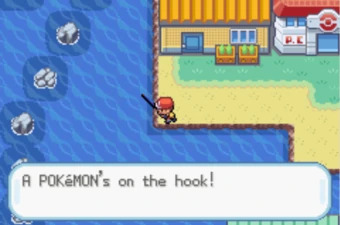
Pokemon Series
Since the very first Pokemon game there has been fishing. You get the old rod from some guy and then you are free to fish up as many goldfishes that you want hoping that one of them will grow up to be a 21 foot tall dragon. Pokemon has combined their fishing with their main game play and makes you at least start a battle with the fish you drag onto shore. Now fishing in Pokemon is pretty subpar mainly because a single Pokemon game hasn’t really been known to have more than a handful of Pokemon that you can fish for. Also if you are looking for a strong water type Pokemon you could do a lot better than fishing for it. Typically a Pokemon player will fish about 5-10 times total. And although fishing for Pokemon isn’t all that great it has been in every game for over 20 years and that is pretty impressive. It’s a small detail that makes the world of Pokemon feel like a real world of wild creatures.

Sonic Adventure DX
In Sonic Adventure DX you are given the choice to play as a lot of different characters, one of which is named Big the Cat. Most of the characters are combat characters that rely on speed and attacks to get through levels, some even wielding rocket launchers and extremely oversized hammers. However when you start the story of Big the Cat you are thrown in a completely opposite direction. Big the Cat is a giant purple cat who lives in the jungle with his best friend Froggy. Froggy accidentally swallows one of the most powerful objects in the Sonic universe and Big the Cat must chase him all over the world trying to fish him out of where he is hiding so that he can eject the Chaos Emerald out of him and they can return to their life in the jungle. The fishing mechanics in this game actually are really good and this is probably because Sega had just put out a series of mildly successful Bass fishing games before releasing this game. Either way its absolutely hilarious that Big the Cat gets to defeat Chaos 6 right before Super Sonic has his showdown with Chaos Perfect.

Final Fantasy XV
In Final Fantasy XV you play as Noctis and his favorite hobby is fishing. When I first played this game I sped through it and never fished once and reached the end of the game never indulging Noctis in his hobby. When I replayed Final Fantasy XV I fished for 50 hours and then ejected the disc from my console. The fishing in Final Fantasy XV is surprisingly deep with a lot of the vendors supporting what you could call a fishing road trip. In the game it is extremely dangerous to be out at night so I would plan day trips to lakes to maximize the amount of fishing I would get to do. I would prepare days in advance to make sure I could afford the trip and that I had enough supplies to both protect myself at the lake and have enough supplies to last the whole day. Final Fantasy XV really is a game about getting really distracted and fishing is probably its best distraction. My days on the lake were the perfect balance of peaceful and rewarding, this game offers an awesome reward of well planned trips and a good haul of fish.
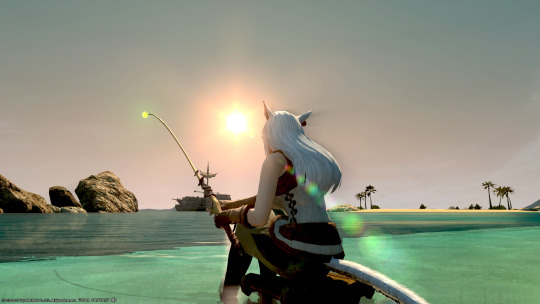
Final Fantasy XIV Online
Final Fantasy XIV is the only game I have ever played where the fishing played exactly like its combat. When you are fighting enemies in a dungeon in FFXIV you are constantly adding buffs, landing hits, using consumables, and managing resource bars. When you are fishing in FFXIV you are constantly adding buffs, landing hits, using consumables, and managing resource bars. Note you are doing so at a much more leisurely and less life threatening pace but you are still doing it. I never maxed out the fisher class but I got it into the expansion content which was a really long and relaxing experience. Yet another Final Fantasy title where the real meat of the game is in getting distracted. When you fish you also sell on a player market that fluctuates based on market price just like real fish. You get the relaxing fishing side of the game and also an aggressive economic number crunching side as well. I spent way too long with a real pen and paper deciding how much I should sell for on any particular day and bossing around my two cat girl employees.The MMO aspect of the game adds so much to what you would expect to be a very solitary experience.
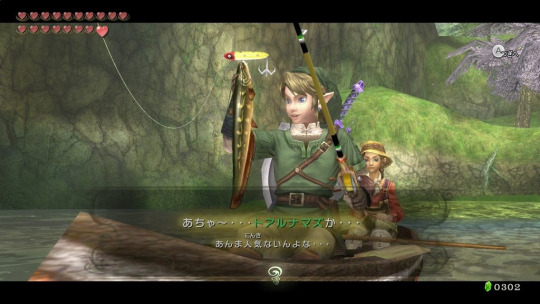
The Legend of Zelda: Twilight Princess
Have you ever gone fishing for hours to receive an empty bottle? That is exactly what kick started my addiction to fishing in Twilight Princess. An empty bottle in Twilight Princess means another way to heal yourself, another way to add oil to a lantern, another way to carry useless water around. The only way to get the 4th bottle in the game is to go to a dedicated fishing spot and fish until you pulled it out of the pond. The actual fishing is pretty weird, it involves motion controls which I still am not entirely sure what they do or how to properly use them but it is really fun to hold the pole in gyroscope and set the lure in the water waiting for fish to come get a nibble. Although the physics with the water make it difficult to see if you have actually gotten a bite or not it still is enjoyable the other 85% of the time it works.
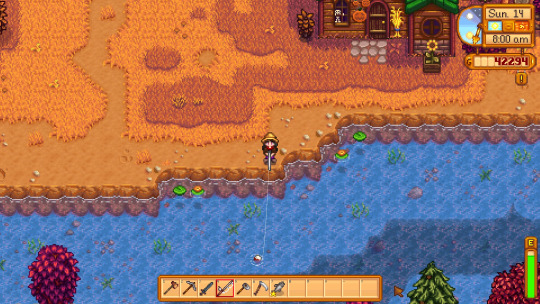
Stardew Valley
So this one is at the top of every other “fishing in games” list and there is a big reason for that. It’s really good. I think in my first Stardew Valley farm I gave up farming entirely and fished all day every day and stopped to buy food to replenish my energy and go back at it. I really didn’t care about getting rich or making enough money to expand the farm or get to know everyone I actually spent about 50 hours just fishing. The fishing takes some skill and a pretty keen eye but the random jerks of the fish and the rhythm of the game play are so fun to try to master. It’s a part of Stardew Valley that I felt like I was continuously improving on as time went on and it was really fun. I mean I don’t recommend it because you’ll end up moderately poor but it was really fun.
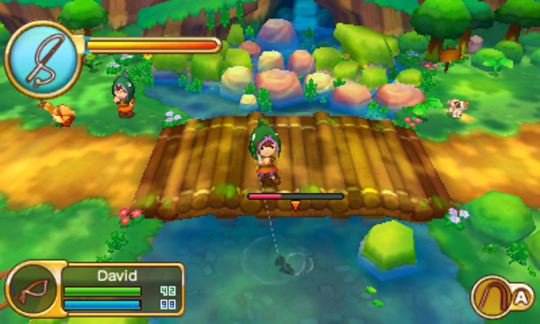
Fantasy Life
Fantasy Life offers you 12 potential jobs, you could be a brilliant blacksmith or a devious potions maker, a lumberjack or a knight, a hunter or a seamstress. However your inner dad is calling and you decide you want to play through a fantasy RPG as a fisherman, hell yeah. the story is relatively short so you can quickly unlock a lot of locales to fish at and there is a manageable economy system that lets you deal in fish in advantageous ways. You can even pick up cooking on the side and make fancy dinners and sell the fish for higher you can do that as well. Fantasy Life is like a clever mix between Animal Crossing and Final Fantasy XIV and it kind of succeeds and falls short of it. The fishing also takes a good amount of skill and rhythmic approach to master so it doesn’t get boring almost at all until you have cleared the game.
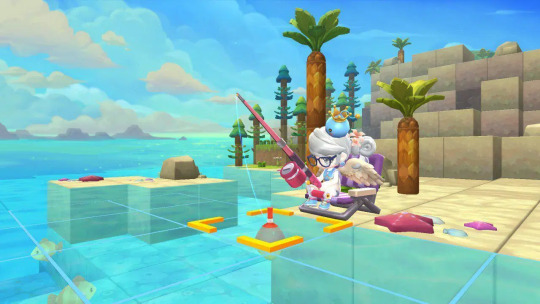
Maple Story 2
Maple Story 2 is one of the most expressive and cutest games that I have ever played. And the fishing is no different, its all about style. The fishing in Maple Story 2 is monotonous and can get old but you do it for the chibi clout. Because much like the rest of the game you can look however you want and do whatever you want and sometimes you just feel like kicking back and throwing lure in the water at the beach. I never got super into the fishing in this game but it won me over with its adorable design and stylish atmosphere.

Animal Crossing Series
Of course I had to include the most popular game right now. Animal Crossing has become something of a connection between people when we can’t leave the house. A thing we all have in common on social media and with our friends. My first experience with Animal Crossing really starts with New Horizons and I was completely blown away. The fishing isn’t super complex or difficult but the range of what you can pull out of the water and what you can do with it is absolutely breathtaking. For a game about cartoon people living with humanoid cartoon animals the fish looking photo realistic. And the museum where they can be kept is stunning. The museum looks like it was designed to capture the feel of being in a museum and matches the design of all the great real life aquariums and observatories. Although it is a bit frustrating when your rod breaks it is easy enough to make one (or worst case buy one) to get your bait back in the water.

Super Smash Bros. Ultimate
Tell me I’m wrong, you can’t. Isabelle getting added to Smash brought a very powerful fishing move that isn’t practical all the time but is really funny. Wouldn’t recommend this game if you are looking to relax and fish but I do recommend hooking your friend with a fish hook and send them flying off screen if you had to.
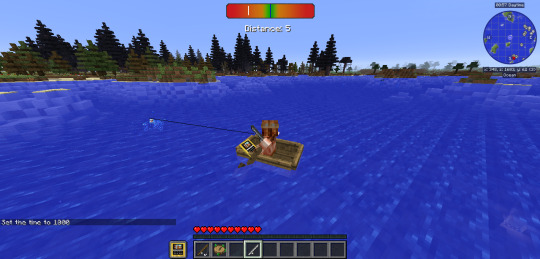
Minecraft
I have a very special role in Minecraft when I join a friends server. A role that I assign to myself. While everyone is off getting awesome swords, spelunking for diamonds, and exploring the infinite landscape, I build a small wooden shack and I set up a farm with an irrigation canal and start fishing. A steady supply of food is necessary and while I’m hanging out with my friends in a server I’m happy to be the one to provide it. The fishing in this game is probably the slowest of all the ones on this list but is the most useful. just throwing the fish in the oven creates food that can help keep you and your companions alive for a long time. I think I definitely have my limits with Minecraft fishing and I couldn’t do it for hours on end it is rewarding to set up shop and find a nice place to settle down for a few hours to fish.
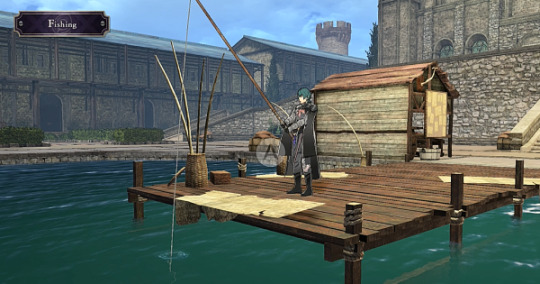
Fire Emblem: Three Houses
This is the only Tactical RPG in this post. Fire Emblem: Three Houses has sections between combat where you can go and talk to your students and do other activities. We aren’t here to discuss other activities though we are here for the fishing. The fishing allows you to catch fish for some reason that I’m sure is good but never intrigued me enough to learn. All I know about the fishing in Fire Emblem: Three Houses is that it’s fun. I started to bust through combat just so that I could get back to fishing. The funniest part about this one is that the fish has a health bar. Pressing the A button at the exact moment finds a way to become easier and still find ways to mess you up. Either way, I’m not that interested in tactical RPGs but I heard there was fishing in this game so I had to play it and it was worth it.
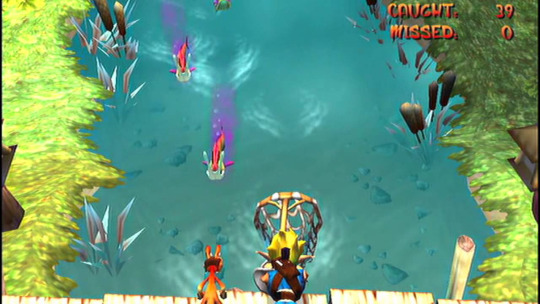
Jak & Daxter: The Precursor Legacy
In Jak & Daxter, Daxter gets turned into a small animal by dark eco while exploring a dangerous island off the shore of his home with his best friend Jak. To get back to the island to investigate, the pair have to borrow a boat owned by a fisherman who is troubled by an invasive species of poisonous eel that is ruining his haul. He asks Jak to catch fish for him without catching any eels. This fishing mini game can only be done once but it is going to either be something you think is very unique or a huge waste of time. All I’ll say is that the sound that the fish makes when it goes into the net is absolutely a reward in itself it is so satisfying. But anyways, more intense than some other options here but get it done so you can get back to absorbing eco powers and jumping on stuff.

Shovel Knight
Shovel Knight is a 2D action platformer but you can also fish. And you fish for the best kind of fish, money. You can get some other stuff too like health pickups and magic replenishers but we know what you want. You see that little glint and you pop out the fishing rod and pull out those money bags. If you are devoted enough you can even get a surprise from the Troupple King (long live his highness) if you fish out the right stuff. I don’t even know if I fished all that much when I played Shovel Knight but it’s hilarious that you can.
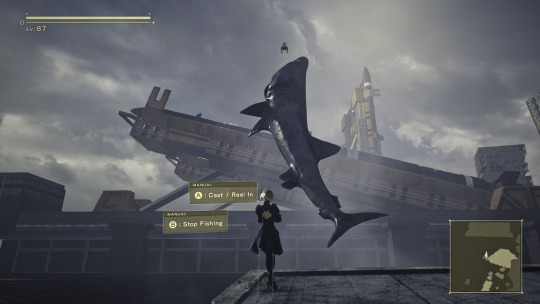
NieR: Automata
I did not play a lot of NieR and that’s because I was fishing. I don’t know why all I did was fish but you throw your little robot in the pond and you lean on a magical stool so honestly it was good enough for me.
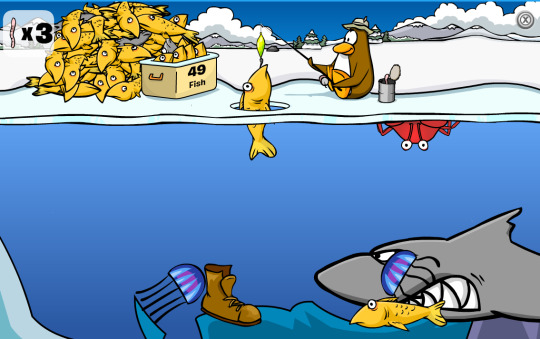
Club Penguin
If you know then you know. In hind sight there really wasn’t a whole lot to do in Club Penguin but this mini game really messed me up. You basically get to move up and down, catching fish and avoiding trash and other hazards. Basically trying to do this and catch as much fish as possible to avoid having to ask your parents for real money to pay for snacks to feed a virtual ball of fluff with eyeballs. I don’t really remember how challenging it really was but I remember getting decently high scores to about like 100 fish per round so I guess it was pretty easy if I could do that at age 10.
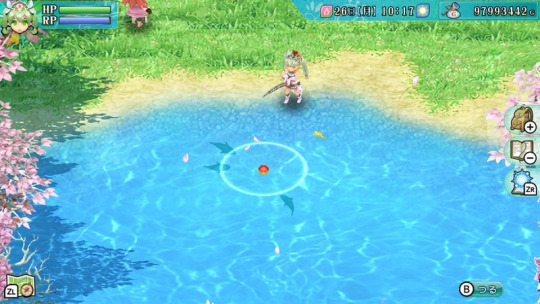
Rune Factory 4
I’m gonna be very honest about this one and say that the fishing in Rune Factory 4 is basically just Animal Crossing fishing but more anime. The fish react to the pole the same, the fish almost look the same, and the buttons to respond are the same. What makes this one special is where you can take it. You can fish in the little moat in town, in the lake, in a dungeon full of monsters, in a lake that is eternally the season fall, anywhere. You are constricted by the boundaries of Stardew Valley and that is how much energy you have and how much time you have in the day. It’s still fun to fish but I wish that they had used their fun fantasy setting to give the ability to fish up some cool made up fish instead of strictly things that exist in real life.
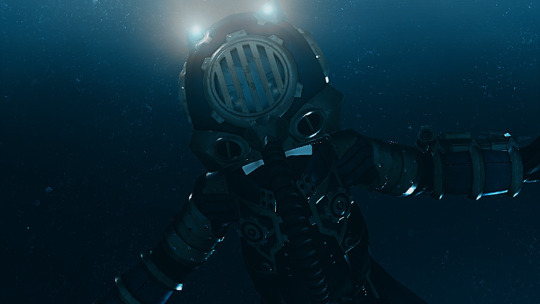
Xenoblade Chronicles 2
Ok, diving, fishing, same thing. Diving in Xenoblade Chronicles 2 is just fishing with your whole body. It works a lot in the same way as Pokemon where you fish up monsters to fight and get the rewards from them. It is a completely optional activity however if you decide to undertake the grind of scavenging in Xenoblade Chronicles 2 then you will never hurt for money ever again. It makes my wonder why Rex stopped being a salvager to do odd jobs because this was PROFITABLE. The main incentive is that there are spots that spawn a certain enemy that drop cores. Cores are like gacha or loot boxes that contain new anime girl partners that deal huge damage in fights. They even have their own side quests and story lines. I spent maybe 30 hours grinding before giving up on this game and while it does become tiresome I really enjoyed the random rewards of possibly getting a new companion or a really cool weapon.
It’s been tossed around that every great RPG has fishing in it. I won’t argue that point but a lot of great RPGs certainly do have fishing in them. Everyone needs a break sometimes and fishing is the perfect activity to remind us to stop and take that break. Even games can get long and without these distractions it might be so much harder to complete these harrowing tasks. Don’t forget to take breaks and just enjoy the sound of the water every once in a while because there’s no rush playing video games.
Honorable Mentions:
Kingdom Hearts: Sora fishing with his bare hands on Destiny Island
Persona 4: Weird aqueduct fishing
Persona 5: Marina fishing life
Sea of Thieves: A pirates life for me
#fishing#fishing video games#fish#kingdom hearts#persona 4#persona 5#sea of thieves#xenoblade chronicles 2#rune factory 4#club penguin#nier automata#shovel knight#jak and daxter#fire emblem three houses#smashbrosultimate#animal crossing#minecraft#maple story 2#fantasy life#stardew valley#twilight princess#ffxiv#final fantasy 14#final fantasy xv#final fantasy 15#sonic adventure#sonic adventure dx#pokemon
3K notes
·
View notes
Text
Say Your Piece II: Heart Breaker

❛ pairing | hvitserk x reader, hvitserk x ?
❛ type | double triple? shot, mistakes were made au
❛ chp summary | after the reader says she doesn’t want hvitserk; he makes a bad decision. it gets worse from there.
❛ tags | plus size reader, verbal arguments, extreme social anxiety, extreme body insecurity, drinking, hateful words, illustrator hvitserk x writer reader, mention of infidelity, shame, OCs, sexual frustration, blackmail, cheating mentioned, verbal abuse, sexual blackmail, poor communication? it’s more likely than you think. tags to be added.
❛ request | So Hvitserk request (you a asked for it 😂) Remember the Little Lovers event and the self-conscient plus size reader who didn’t want to have sex ?Well I didn’t get the sex lol. I want my Hvitserk to show a woman how her body is enjoyable. Thank you 😊 for @alicedopey
❛ sy’s note | i’ll eventually get you your sex scene, DAMN IT.

He wakes with a blaring headache caused by a stream of fresh morning light against his soft cheek. He pulls his arms around you-- or, what he thought was you, as the moment he does so, he knows it’s wrong. Where soft folds and overflowing breasts were, he finds thin limbs and small breasts.
It’s not your body-- he realizes all at once. The high rise apartment that overlooked the city wasn’t, either. It was the fruit of an accomplished older woman, whose many books hovered on a white shelf beside a white bed. Everything in the room holds the same pure standard. He flings himself from the bed, his naked ass colliding with a nightstand. The items ripple over the surface and settle into new positions. The woman pushes up, dragging the painfully monochrome white fluffy sheet to cover her flat chest.
“Hvitserk?”
Erika, in all her sharp-eyed glory, stares right back at him. Vomit spins up his throat, incited by the affection by with her eyes considered him. Hvitserk scrambles over the perfectly plain hardwood floors, upchucking up what’s left of his agitated stomach after his pathetic night out on the town.
“Hvitserk!”
Her spindly hand is at his back. Ordinarily, she was a comfort in your absence. That despite her pushing, and pushing, and pushing to get your name off “his” book, she would always be there for him in ways that a lover could not. Author-illustrators make so much more than being an illustrator alone, she reminded him. Her considerate words now feel like measured steps against his relationship. Her touch rips his skin into gooseflesh. Hvitserk works his shoulder away, his knuckles becoming white around the bowl.
“You drank too much last night.” it’s a non-question. Obviously, if he were here, he had. He groans his miserable response into the toilet bowl, wishing he could smother himself in the water, as it would be a better punishment than anything his girlfriend could do to him. “I’ll make you some coffee.”
Her steps become distant echoes. When he finishes and cleans after himself, he starts his search for his clothes. He picks them from a singular pile, draws them back on, and reaches for his phone. It bleats a miserable eight percent battery life.
“She didn’t call if that’s what you’re thinking.”
Ericka stands in a silvery slip; although he’s not sure when she put on some clothes. She hands him his cup of coffee and takes a seat on her “divorce couch”, a plain grey chair that she scammed her ex-husband out of. As she sits there, all long limbs, and purposefully sultry clothes-- the guilt strikes him.
Hvitserk takes a sip of bitter, burnt black coffee. She’s never been a great coffee maker but her heart is in the right place. It wouldn’t feel right to snuff her. After all, he probably spent the night before buried in her cunt.
“You called me to pick you up at the bar last night. You were so drunk all you wanted to do was lay on my chest,” Ericka pulls a sheer black kimono over her thin collarbones. His eyes fall on her hands. “I told you she’d break your heart. Women like that-- once they get over a certain weight-- they aren’t emotionally available to do anything but eat. It consumes them.”
“She ain’t like that.”
“If she’s not like that, then why did you have sex with me? Be honest with yourself, Hvitserk. Your needs aren’t met with her. That’s why you needed me.”
His mouth runs dry. Like he’s been chewing on his regret as if it were paper. He couldn’t remember the night before. It was like a bad memory he never wanted to recover. Hvitserk glances down to his cup as he sinks onto her bed.
“It was an accident,” he glares at the surface. “I- You know I can’t be with you, right? You’re--”
“Old?” she asks. He’s never cared about something as simple as that. Twelve years his senior or not, it wasn’t an issue.
“It’s not that. C’mon Erika, you know I don’t give a shit about age. She’s my baby girl.”
“You’re going to stay with her? A woman like that?”
“Like what?” Hvitserk sets the coffee on the nightstand as he snaps at her before he could bite it back. He knew what she meant. Erika’s long ranging sigh reminds him of Aslaug. How tenderly her hands would wrap around him even though they were truly tainted with alcohol perfuming off her breath.
“I’ve been your agent for years Hvitserk. We go through this every time you find a girl. This oen is by far the worst. She doesn’t care about you. Look at all that work you did for her yesterday. The pendant you bought her. The work you’ve put into her books! You even pick up all the food she eats. She won’t go outside of her house and you still expect that she’ll suddenly become this fat trophy wife on your arm.”
“Just because she’s fat don’t--”
“It isn’t about the fat, Hvitserk. How many times does she have to show you, or tell you for you to get the picture through your stupid head, huh? She doesn’t want you! And you have the balls to call me a fucking accident.”
“Erika--”
She leaps up from her chair. Hvitserk sucks in a hard breath and tries to find sense through the nonsense, looking through his phone. Erika was right. You hadn’t sent a message. Not in his texts, not on his social media. More egregiously, he spots a new post. Ericka’s hands fold over his, pushing him back to sit on the bed. She slides over his thin hips and takes a seat on his empty lap. It was painfully simple, painfully domestic, and painfully wrong.
“Let me tell you what I’ve learned in forty years,” Erika whispered in his ear. Her thin lips move, gliding like butter in his ear. “If someone doesn’t want you, there’s nothing you can do to change that.” Her fingers comb through his hair, like slimy tendrils. “But I’m here.”
Hvitserk tips his head nack, gazing at the ceiling. Her palm caresses his scruffy jawline to drag his attention from the ceiling to her soft blue eyes, a painless depth, if only he would listen to her words. Hvitserk shifts her back on the bed, loitering around her waist with a supportive hand on the base of her back.
“I know you care ‘bout me. I just-- need some time, okay?”
It doesn’t slip him that she’s scowling as he walks out of her home. There was someone he could count upon, when things were difficult, his phone buzzing in his palm reminded him of that.
“Hey, Ivar.”

Or, maybe not.
“You fucked her?” Ivar stopped chewing his pastry, ambling his head one way then another, laughing against himself. He took his mug of properly brewed coffee to his lips. Hvitserk regrets agreeing to meet him at the cafe. “What were you thinking sleeping with your agent?”
“I wasn’t thinking! I was drunk--” Hvitserk set his hand to his forehead. He has no appetite as he cycled through what he had done, searching out the moment that he called Erika. He fails to locate anything but quiet sobbing behind the neck of a beer bottle and a distant, squeamish feeling of fingers down his nape. “I think she took advantage of me.”
Ivar sets down his cup of coffee, picking up a fork and knife as he leaned over the table, lips punctuating each word.
“Yes, well, I am sure that will go over with your girlfriend well. I’m sorry, I slept with my skinny, well-established agent who has been wanting me to get rid of you. That bitch has been after you for years. What do you think she will do now? She won’t let you go.”
“She understands,” he reflects at the monochrome crowd. His plate is full but has gone cold with his lack of appetite. Normally, this was the place he came with his brother to binge breakfast and muse about women. Ubbe wouldn’t care about his issues: he never had time for anyone but himself. Not really. Ivar scoffed, gazing into the foot traffic flitting by their cafe.
“Tch, I’m sure she does. She will probably break up with you.”
He bobbed his head.
“I think she already has.”

A normal man would come to beg.
But Hvitserk draws in the deep quiet of the park. With only the barks of dogs, the giggles of children, and the occasional frequency from couples watching movies in the park, it’s a place of solace by the small pond.
He starts with an outline of Xiao’s small face. It’s a rough outline, budding and ready to be kissed with by watercolours. Soft pinks like petals of peonies droop in his photo. He must have blended this shade wrong. Line after line that he sweeps, he weeps. His phone jingles in his pocket and his heart tightens around his chest like a straight jacket to someone in an insane asylum. He must be going crazy-- if he too can no longer paint.
“Where are you?!” you boom on the other end of the line. Hvitserk fumbles his phone, suckling in a breath. Had Ivar told you? No, his brother wouldn’t. Not Ivar. He was never a gossiper.
“In-- in the park?”
“What has gotten into you? You could have at least texted me to tell me you were okay. I was worried sick!”
You? Worried sick? This wasn’t the you from yesterday. The one that pelted out how selfish he was for craving intimacy. The one that told him that all he wanted was to sexualize you. As if he were some sixty year old pervert with a camera in hand to click a picture of under your beautiful pastel skirts. Hvitserk sets the brushes into his cup of water and sets aside Xiao’s painting to dry.
“Hvitserk!”
“I’m here,” he blurts out. “I didn’t think you’d care. You didn’t call.”
“Like I didn’t I call you all night.”
Something cracks, deep in his belly. With all the days of work he’d done for you and you alone, he forgot himself in the mix. He jerked his phone back, frantically looking at his phone app. No recent calls meant what they meant. When he finds nothing, it only thrusts him into a further rage.
“Bullshit,” he belts out. “You didn’t. You didn’t care about me last night. You never fuckin’ do.”
“Hvit--” he turns off his phone. There was a sliver of a moment in which he regrets that on the basis of last night. Maybe you rejected him, but he wasn’t an idiot. A man simply didn’t cheat on his girlfriend because she said no.
He packs up his bag and heads toward the football field. It’s time to play football.

He smashes Ubbe on the field. If he wasn’t at peace with being an illustrator, maybe he could have been a ballplayer. Flipping the ball from foot to foot with Ubbe on his trailing his tail was fun, but watching him try and miss as he thwacked the ball on its net was even better. Unlike Ubbe’s well-proportioned body, he’s all long limbs and quick feet. Just the right combination to slip out of Ubbe’s grasp. Well, that was, until Ubbe tackled his ass onto the blades of grass, sending the both of them rolling through the grasp.
“Bro, really?!” Hvitserk laughs, dropping back onto the grass. The skid marks on his clothes would be unreal.
“If I can’t catch you,” Ubbe heaves, digging his hand into his pocket. He finds his phone there, vibrating with messages from Torvi: probably. Hvitserk shoves his arms behind his neck, drawing out breath after ragged breath.
“Wanna go eat?”
“Na,” Ubbe shoves himself onto your feet. “Your girl is here.”
His what? Ubbe rushes off. A sinking feeling came over his clammy hands. He opens his mouth to beg him not to go, to take him along with like he used to as a child. He’s terrible at making up and hours ago, he’d hung up on you. His lips press together, soothing himself with the false pretense that-- no, it would be fine. If you didn’t apologize, perhaps neither would he.
He finds you on the other side of the soccer field, fashioning his favorite sundress. There’s something glamorous about its corset bodice and its draped sleeves that left him breathless. He wills down his terrible arousal, drawn to the pendant he bought you nestled between your large breasts. You wait for him by his things, pulling the rim of a broad pale hat and looking down at beautiful chunky nude heels.
You’re beautiful and terrifying all in one. He regains himself enough to make his legs solidify from the liquidy mass they were seconds ago. He might feel much like a newborn calf falling over himself to get his things, but perhaps he looked better than he felt. Women like sweaty, stupid men, right?
“What are you doing here?” he picks up his things. “I thought you didn’t like to be seen in public.”
“You hung up on me,” you hold his tablet flush against your dress and offer it out to him. He takes it and secures it back in his bag. “I had to come to find you.”
“Yeah? I’ll bet.” Hvitserk wills down the painful throbbing behind his joggers, pulling his bag to obscure the pain he was in. The sooner he went home, the sooner he could jerk himself off without the overwhelming guilt of being, as he was, a whore. Why couldn’t he stay mad? He wanted to stay mad! “You look... nice. Never seen you looking so nice. What’s the occasion?”
“You like it?” You pull out the skirt and stop to do a twirl that he curses himself for stopping for. Normally, his girl wouldn’t even go outside. Who was this? He’s aware of others watching-- the fat girl in a flashy dress. “I wore it for you.”
“Yeah, I do.” He moistens his lips, his voice raspy and thick. “Looks like an angel.”
“Does that mean you’ll come back home?” You reach out for him. Your soft hands winding around his well-corded arm. He realizes then, the confidence in which you carried yourself masked the desperation in your hands. They trembled over his bicep. “I’ll be good, I promise I won’t yell at you again like that. I wouldn’t even be mad if you-- you found someone else to fuck. I know you-- I know you need it. If you can’t get it from me, I can wait on the side. As long as you’re not in love.”
“Hey,” he softened, settling his hand atop of yours. He stops midstep, turning on his high tops on the sidewalk. He takes your hands and listens waits for your outpouring of emotion. Traffic passes by him. They speak in hushed whispers. “Hey, hey, hey. Baby girl wait-- that’s not -- what are you talking about?”
“I didn’t mean it. I didn’t mean to yell at you like that but you were pushing and pushing and wouldn’t stop! I didn’t know what to do. I want to have sex with you,” you squeeze his fingertips. “But you don’t know what it’s like to be fat, old virgin.”
He was trying to listen. He really was. The moment you spoke that word: that v-word, his mind went blank and numb. You’re still talking long after he’s stopped listening. Hvitserk sucks in a breath: it sends him into a flurry, pursuing the bone of your virginity long after you’ve stopped talking.
“What do you--” his lips twitch, drawing in a smile. “--mean a virgin?”
“I haven’t had sex-- I… I wanted to--”
His girl-- a virgin. He wants to smile, if not for the knowledge of the other night, waking up in Erika’s itchy sheets. Hvitserk knows that he has to tell you, he only doesn’t know how. You’re talking again.
“What did you say?” he asks.
“I want you to do it,” you answer. “Right now. Just forgive me.”
He about drops, a moistness coming over his mouth that he can’t-- exactly-- help. His palms feel just as hot, sweating as he pulls them free from yours. Clearing his throat, he slips his hand against the small of your back.
“Na, let’s… let’s take it easy. We’ll talk ‘bout it later.”

He wants that virginity.
But logically, oh woe is he, he knows it’s not really right to take someone’s virginity if they’re not all there. You’re not all there because you don’t know of that night. It’s like, consent, right? Bad consent was just jerking your ankle like some Viking and dragging you into bed with him. If he was going to do it, he told himself, you had to know what he’d done.
It was a slip-up.
Hvitserk finished another drawing for his new book independent of your input. It was a children’s book about good bodies-- because as he looked at your good body, he was reminded of Ericka’s cruel words. He wanted to do better for lil kids.
“Hvitserk, your phone is ringing,” you said pointedly from across the room where you sat like a madwoman. Your frantic papers sat nestled around a basket of shared chicken he made for lunch.
“Huh?” Tapping over, he recognizes Erika’s photo, planting a kiss on his cheek on his first big break. She had been the first one to really believe in him. It was a long time ago now, he reminds himself to change that to something more… suitable after last night. He gestures his fingers at you. “Thanks, baby girl.”
He answers the phone. The moment he does, he hears Erika’s flat voice snaking into a hiss. It’s a noise that he hasn’t heard. Not in all his years of having her as his patient agent.
“You’re with her, aren’t you?”
“No, I’m uh-- with Ubbe.” He throws you a glance. You tilt your head, he shakes his, and that’s the terrible loneliness of holding a secret. “Erika--” Hvitserk sighs, parting his lips to talk. She shushes him with such severity that he thinks she’s trying to lop his head off, too.
“Break it off.”
“What?”
He steps outside and leans against the cold metal door separating the high-rise apartments from, well, the outside world. He expects to see her standing out there. All he finds are the many cars parked on the street and the stillness of movement. It’s too quiet. The whistle of the wind through the street chills him.
“I know you’re with her. I can tell her for you if you’d like.”
“No. Don’t--” Hvitserk sighs, searching for the words in the silence. “I don’t think you understand. We worked through it.”
She laughs something from deep in her belly at him.
“I wasn’t asking. Either you do it— or I’ll make you do it. You obviously don’t know what’s best for yourself. Why else are you fucking around with some--” He collapses on the stairs, cradling the phone to his ear as she goes on. “Don’t think I won’t expose her for what she is. A thief.”
“She’s never-- Why the fuck are you doing this?”
“You told me you would take care of it. Something you’ve failed to do-- I should have known you couldn’t do it. ”
“If this shit is about yesterday--”
“I’ll give you one more chance to break it off if you come over tonight.”
“Are you blackmailing me?” There’s a pause on the other line. Then a chuckle. A long winded, painful chuckle. He should have known better. That night-- calling it an accident wasn’t exactly tolerable for a woman like Erika. She wasn’t the kind of woman who could be easily ignored.
“If that’s what I have to do.”
He chokes out a sob. Ivar was right. She wasn’t going to let him go.
“Fuckin’-- fuckin’ fine.”

@punkrocknpearls @flowers-in-your-hayr @tephi101 @alicedopey @supernaturalvikingwhore @tootie-fruity @titty-teetee @queen-see-ya-in-valhalla @ethereallysimple @deathbyarabbit @deathbyarabbit @readsalot73 @natalie-rdr @lol-haha-joke @lisinfleur @hissouthernprincess @marvelousse @dangerous-like-a-loaded-pistol @vikingsmania @wish-i-was-a-mermaid @lif3snotouttogetyou @gruffle1 @cris101071 @gold-dragon-slayer @babypink224221 @wonderwoman292 @naaladareia @beyond-the-ashes @generic-fangirl @chinduda @laketaj24, @peaceisadirtyword, @ly–canthrope @cris101071 @daughterofthenight117 @unassumingviking @ladyofsoa, @inforapound @winchesterwife27 @feyrearcheron44@readsalot73 @squirrelacorngliterfarts @gold-dragon-slayer @medievalfangirl @sallydelys @bluearchersstuff @affectionrabbitt @whatamood13 @notyouraveragegirl17 @igetcarriedawaywithyou @unacceptabletatertots @ivarandersen @stra-vage @tgrrose @cookies186 @learninglemni-blog @theleeshanotlouise @soiproclaim @msmorganforever @destynelseclipsa @soleil-dor @strangunddurm @superwolfchild-fan @deans-ch-ch-cherrypie
#Hvitserk x Reader#Hvitserk x OC#Hvitserk/Reader#hvitserk's heathen feast#hvitserk ragnarsson x reader#it feels good to write my baby#Hvitty x Reader#hvitty/reader#vikings imagines#vikings imagine#hvitserk x plus size reader#Vikings x Reader
108 notes
·
View notes
Text
Not to be morbid on main, but everyone dies and people are rarely prepared for it. It’s so much easier when you know your loved one’s wishes. So even if you’re a teenager or twenty-three and healthy, I hope this helps you start thinking about end-of-life wishes, because it can happen to us all (both the dying and, rudely, being died upon).
Cremations are an affordable way to subvert the funeral industry, but going this route puts the burden of “the little things” on the family. I’ve learned a lot in the last 36 hours and wanted to pass those things that weren’t on any checklists, because the burden is on you to navigate the process.
Putting this under a cut because it’s so long (although not comprehensive). Obviously some of this is altered because COVID and some is meant to be applicable in some distant, theoretical future when we can go out to lunch again.
Before you die
Think about it, talk about it, write it down
Think about what kind of rememberance you want, if any. If it doesn’t matter, tell people that so they don’t fret about it and grieve in whatever way works best for them.
Communicate now to save your family and friends angst later.
Build an “in case of death” binder, zip drive, google doc with links, etc. Make sure your passwords are up to date so that’s not an administrative nightmare for your loved ones.
Advanced directives. Here’s a great article explaining the types of medical advanced directives and decisions to make before an accident or illness happens, including whether you want to donate your organs.
We lost grandma for about twenty minutes yesteday because we couldn’t find the paperwork and grandpa couldn’t remember where they signed up for services. Death. Binder. Have a death binder/folder/zip drive so no one loses grandma.
Insurance.
You likely have insurance through work, so consider that. It will also expire if you leave your job.
You can usually get, with minimal fuss, a 10- or 20-year term policy with enough to cover your arrangements and debts for less than $20 a month. Death expenses are anywhere from $5-$20k, conservatively.
Talk to your auto insurance agent and score a multi-line discount.
Body snatchers.
If you want to be cremated, talk to a local crematory beforehand and give them your basic information. It can be paid out of your estate (i.e. by your family or a life insurance policy) when it happens.
Most funeral homes (I believe) require pre-payment. It’s super morbid but there are TONS of heavily discounted grave sites for sale on Craigslist if that’s the route you want to go.
Here’s a list of certified green burial sites in the US.
Donating your body to science 101.
Memorial service.
The idea of a “proper” funeral is more or less out the window, especially in the time of COVID. Celebration of life? Religious ceremony (or not)? A picnic at your favorite park? Anything goes, so figure it out now.
When my sister-in-law died, we had a celebration of life at a non-profit who donated the space and had a poker tournament with her ash tin (she lost).
Whether you have strong or no preferences, write that down to guide decision-making.
Memorials.
Traditionally people would donate money in the event of a death to a charity, foundation, or family account, or flowers to a funeral home or church.
Family accounts (like for children) are traditionally done in care of the deceased’s bank but online fundraisers are a thing.
If you have a particular charity you love, add this to your list of wishes.
Food.
Before COVID it was pretty typical for there to be some kind of meal after a funeral. Will this be a restaurant?
This is ultimately up to the family but if you have strong preferences (i.e. no church or Italian food), tell people now.
Obituary.
Writing down the basic facts of your life, hobbies, and accomplishments you want included in your obituary means your family doesn’t have to do a guessing game.
Plants, animals, stuff, etc.
Do you want your clothes to go to a specific charity?
Do you NOT want your stuff to go to a specific charity? (Goodwill is terrible!)
Who will get your car (person, donate, sell)? Want to have your record collection to go one sister? Obviously family will divvy up stuff how they like, but write down any special considerations.
Have a plan for your pets (insurance, vet info, guardianship).
Please organize and digitize your photos if they aren’t already.
If you lose someone close:
Identify the primary griever
Support that person/those people by providing feedback when solicited, running errands as needed, and running interference so they aren’t inundated with all the little things.
Notifying people
Use the phone tree method. Great Aunt M will be happy to help by calling your cousins. Your boss, coworkers and HR. Your mom’s best friend/your adoptive aunt, your mom’s bunco group.
Ask that family not put anything on social media until the principal people are informed. I found out my grandpa died on facebook!
Esp these days, set boundaries for visits (who, where, and in what capacity).
Designate one person to be the primary contact for extended family to keep the burden off the primary griever(s).
Give this persons’ information when the first phone calls are made. It also makes sense for this person to be the travel coordinator.
This person should have a good handle on family dynamics (i.e. my aunt is flying in and would drive my grandma nuts so she’s staying with Mom).
This should be their only task because it’s time consuming.
Food
When people die, people gather, even in the time of COVID. Be responsible but expect a ton of drop by food. Clean out the primary griever’s fridge in anticipaton.
Organization
Start a shared family Google doc or sheet. Consolidate to do lists, anecdotes, important contact information, questions and inquiries, etc.
Pay to have the houses of anyone hosting (gatherings, people coming in from out of town, etc.) cleaned. Or, delegate. This can be an act of service for someone who wants to help and doesn’t mind doing the work.
Find the death binder (hopefully), legal documentation, etc. Get a folder or binder for papers if one doesn’t exist. And start a shared google doc for loved ones to track everything.
Delegate
I know I have said this three times, but it’s important. If you’re a primary decision maker do not be the primary do-er. My mom is the primary decision maker so my sisters and I are doing literally everything else.
Say YES when people ask if they can help you. Look at your running list of to-dos and say yes.
Pay to have the houses of people who are hosting cleaned. It will seriously be such a life saver, or this can be an act of service for someone who wants to help.
Social media
You will need to decide what to do with a person’s social media. Do you start a tribute page? Turn their facebook (if they’re old) into a tribute page for a time? Indefinitely? Things to think about.
Thank yous
Keep a running list of people to thank after via hand-written thank you notes. The link includes guidelines on
who should receive a thank you note (gave flowers, brought food, made donations, helped with arrangements or the service(s), did readings, or went well out of their way to warm your heart or show up)
when to send them (ideally 2-3 weeks after the funeral)
here’s how to write them (it doesn’t matter if you buy fancy, ones or dollar store ones, make sure they’re hand written).
Receipts.
Don’t be the petty biatch your cousins hate, but do save significant receipts to be reimbursed by the estate. (I.e. catering hundreds of dollars of food, paying $250 for programs and thank-you cards like I just did, etc.)
Service.
You will have a million decisions to make including
what kind of service to hold, if any
where to hold it
costs
hymns, readings, and anecdotes to share
who will be pall bearers, readers, vocalists, and give eulogies
Crematories handle cremation only, not the service details.
you will need photo boards (Hobby Lobby has nice black foamcore ones) or a powerpoint (and a way to display it depending on the venue)
a guest or memorial book
a card basket,
memorial cards, possibly programs, and thank you cards
Officiants, musicians, religious institutions, etc. all need to be paid (and tipped) for their time.
If we ever wrangle this pandemic, donating funeral flowers to a nursing homes is a fantastic way to brighten residents’ days.
Obituary.
Obituaries are expected, but traditionally costly ($200-$800). As part of the publishing fee, most newspapers keep the obituary on legacy.com indefinitely.
A funeral home will assist you with this, but the burden will be on you and your loved ones if using other methods.
These take hours to write and many hands does not make light work. Keep it to 2-4 key people. Having the facts laid out will help, and so will looking at other obituaries. I read a great tip which was to write about your loved one in present tense first, then change the tense before submission.
Newspapers will update your spelling and grammar but that’s about it. Cheaper alternatives:
Death notice which gives age, date and location of death, and who is handling funeral arrangements. Our crematory put in the death notice for us because they had her body, but the requirements on this likely vary state-to-state.
Here is a place to put a free online obituary.
Plants, animals, stuff, etc.
Save the plants and pets.
Household misc. are usually not dictated by the will, except in special circumstances or contested items. Closest members will go through possessions first. Voice early if you want something in particular, but understand that you may not get it. That’s ok.
Going through someone’s life is an overwhelming process. You may be repulsed and sad and overwhelmed and amused, all at the same time.
In deciding what to keep, as I’ve now cleared out three houses, I’ve found that quality over quantity is the way to go. The sweet spot? 1-2 sentimental + useful things. My great grandmother’s thimble and juicer? Use them all the time, and I remember her lemonade.
It’s okay to throw away some keepsakes and let things get thrown out or donated, depending on the thing.
Don’t give into guilt if you don’t want the china your Aunt Karen is pressuring you into taking when she doesn’t want it either.
Legal stuff.
If someone dies, there will be all kinds of legal things you will need to do (bank accounts, utilities, debtors, education, etc.), investments or 401k, etc.
This varies too much by state and circumstance to talk about in depth but there are guides to specifically help you.
If someone you love has lost someone they love
Do not give platitudes or ask if they’re ok
Don’t expect a response from someone grieving
Do send a card! It’s so thoughtful. I keep a stack of blank condolence cards and a set of forever stamps in my closet. It doesn’t have to be a $20 card to be special.
Don’t judge someone by how they grieve
Offer specific, actionable help if you’re close enough to give it
I am going to come over and clean at 10, leave the house unlocked
I’m at the store and am going to buy cheap vodka unless you tell me what kind of wine you want
oops I got you an uber eats gift card in your gmail sorry/not sorry
Buy thank you cards with stamps as a condolence gift, depending on the person and situation
Send a plant instead of a bouquet of flowers
Make a donation in the loved one’s name if you have the funds
If the grieving person is someone super close (best friend, sister, etc.) add the date in your recurring calender so you can check up on them this day next year with a card and/or phone call
99 notes
·
View notes
Text
'wtFOCKDOWN: the first Flemish quarantine fiction has arrived'
Translated interview about the behind-the-scenes of wtFOCKDOWN
- Source: Knack Focus (16/04)

Scenes in FaceTime, dialogues in WhatsApp and a director who gives directions in Google Hangouts: the youth series wtFOCKDOWN is the first Flemish fiction series in lockdown mode.
The candidates of 'Blokken' play from home, soaps 'Familie' and 'Thuis' get an early season ending, 'Dagelijkse Kost' has a director at distance, 'Topdokters' sends out corona diaries, 'De Ideale Wereld' does telework. Just about the entire TV world has had to adapt to the new reality in recent weeks and find creative solutions. Usually with the help of FaceTime. Or Skype. Or Google Hangouts.
There is a striking amount of video out there.
However, no Flemish series had to go as far as wtFOCK. The youth phenomenon - in good weeks 450,000 unique visitors go to wtfock.be - always strongly focused on real time and the current living environment of young people. If a character experiences something during the lunch break at school, the video goes online in the afternoon on a school day. For example, if the elections are coming or GOT has its last episode, the characters will refer to it.
Which also means that when the schools suddenly closed indefinitely, all plans for the upcoming fourth season couldn't go through. If all your viewers are home, it makes no sense that the characters still go to school. wtFOCK's solution: the first 'social-distancing drama' in the world, as production house Sputnik, which makes the tv series for SBS and Telenet, calls it. Fiction that not only takes place in quarantine, but is also turned into quarantine. On April 1st, the first video went online, a video conversation between characters Senne and Zoë. Since then, the experiment seems to get more interesting every day.
wtFOCKDOWN is the most far-reaching TV answer to the lockdown yet. How did you come up with a 'social-distancing drama'?
Rutger Beckers (producer at Sputnik TV): As soon as the government closed schools, we knew we had to throw all our plans overboard. It was clear that this wasn't just for two weeks: the lockdown would take much longer. Quickly, we started thinking about a plan B within the team, a very young team, and there were some very long video calls. The term 'social-distancing drama' had fallen quite often. Everyone is in the same situation, everyone runs up the walls. Especially young people. In one weekend, their reality has completely changed and their lives take place between four walls. It seemed interesting to adapt the fiction to that new reality. Plus, we hope it can also be a support or refuge. Everyone is in the same boat: that kind of feeling.
We then put together a small team to see what was possible. A few practice scenes have been written. We tested things with the actors. What works? What not? After a few tries, everyone was very enthusiastic. They were also immediately involved with Telenet and SBS. This was much more than a little plaything or filling a gap in the schedule. It soon became clear that, with the right storylines, this was something fundamentally new. Something no one had ever done before us.
The lockdown was announced on March 16th, on April 1st the first video of wtFockdown went online: that is impressive.
Beckers: Especially in the world of fiction. It helps that we were already very tight regarding film schedules of wtFOCK. The recordings are made four or five weeks before the broadcast, which is short for fiction. Even on set, we continued to adapt storylines to current events.
With wtFOCKDOWN, we can plan everything even closer. The circumstances compel us to do so. Nobody can get together - we are very strict about that. So no locations have to be sought, no extras have to be collected or soundcrew have to be booked. We also have to make it with a very small team. wtFOCKDOWN is shot with the actors, a director and someone who does social media. Everyone is also at home and is available. What makes that you can switch very easily. Simply put: tonight we will decide what things we have written today, will be played out tomorrow.
The videos all start from the home screen of the characters' laptops and cell phones. The story is told in WhatsApp conversations, video calls and video messages. A kind of found footage, but in real time. That is cleverly done.
Beckers: Because it also makes sense: for most young people, the screen of their laptop or smartphone is their only view of the outside world these days. Then it makes sense that you tell the story like that.
Moreover, it is the technology that we really use to create the series. The actors act in their own room with their own laptops and mobile phones. First, we rehearse in a video call, while the director watches. When a scene is right, the actors video call each other and record the scene. It also doesn't matter if the quality of image or sound is a little less: that just increases the authenticity.
wtFOCKDOWN has been running for two weeks now, but as an experiment in mobile television it is interesting to say the least. Real-time WhatsApp conversations set to music, where you see the letters typed, for example, turn out to provide good scenes.
Beckers: That is also something that we ourselves are happy with: that these storytelling techniques work. wtFOCKDOWN was a leap of faith. There were no examples, no anchor points. When we put the first videos online, we had no idea what the response would be. But you feel that our enthusiasm after those first tests, is now also the same as the viewer.
That is also exciting as series makers. It started with a few tests. Then a few videos that came online. Then we started building bigger storylines. And it just keeps getting bigger. Every day we are faced with new surprises and new problems to solve. But that feeling that we are creating something new, something that can be valuable in the situation that young people are living in today, only increases enthusiasm. Especially with the people of eighteen or nineteen years old in our team: you feel that they now want to go for it. Maybe this could be the start of a new kind of genre. Real-time fiction, played decentralized. Who knows.
You're sure no one has ever done this before you?
Beckers: I certainly haven't come across anything. We also noticed that countries abroad have been interested in the concept. In the meantime, we're in contact with the Norwegian public broadcaster NRK, who made Skam (wtFOCK is one of the many remakes of Skam internationally). They were very intrigued by our plans and went to show it to Spain, Germany, Italy and France, where local versions of Skam are also running.
While wtFOCKDOWN explores new horizons, a large part of the Flemish television world seems to be on hold. 'Familie' and 'Thuis' must finish their season early. It is unclear what will happen for programs such as 'Mijn keuken, mijn restaurant' and 'The Voice Kids'.
Beckers: Today the situation is very strange for the TV world, especially with the commercial channels. The ratings are going up. Much more TV is watched than in recent years. Only: there are far fewer advertisers.
It is indeed striking that programs such as 'De Mol' hardly have any commercial breaks.
Beckers: Many brands do not want to advertise now and have postponed their budgets until after the summer. Which will soon cause another strange situation. Autumn normally gets very busy, but hardly any production houses are making programs right now. Almost all productions have been shut down. Running a normal fiction series is simply impossible today.
Will we get a lockdown version of the soap 'Familie' soon?
Beckers: I think that chance is slim. (laughs). With wtFOCK, the new technology is just a bit more in the DNA of the program.
The main thing is that no one currently knows. Everyone is waiting for the situation to normalize and to get up again. It only starts again, when there is insight into the matter.
You are in a precarious situation with wtFOCK, I just realized.
Beckers: Why?
When the government announces that schools remain closed, doesn't it mean that all the plans and footage from the fourth season will be thrown away?
Beckers: That's also the disadvantage of the time limited fiction: the time. All of the references to the end of the school year, or festivals, will be tossed. These caught up with the reality. But we'll see how we are going to get around that. We don't have anything meaningful to say about the future. If I have learned one more thing about the past few weeks, it's that you constantly need to adapt to the new realities and to find new solutions. So it's not just about the wtFOCK.
#wtfock#wtfam#behind the scenes#wtfockdown#wtfock bts#skam#skam remakes#skam bts#skamverse#skam belgium
645 notes
·
View notes
Photo
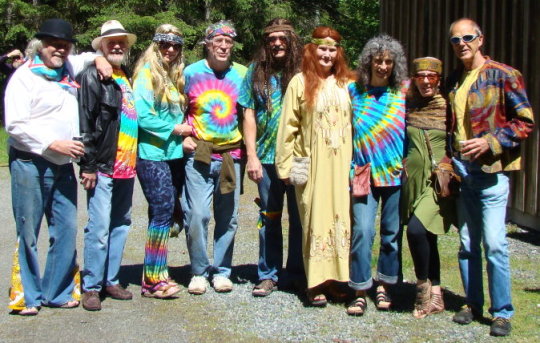
The New Hippies

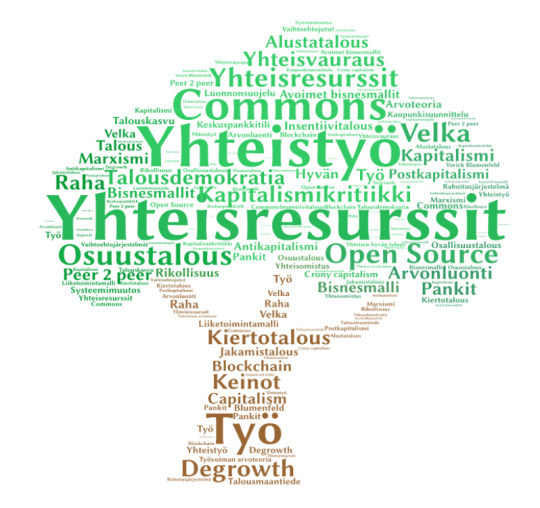
THE NEW HIPPIES: The work abolition movement, anarcho-primitivism and biodynamism as ways to combat climate change
Essay for the course LOGS13b The Strategic Role of Responsibility in Business by Teppo Saari
Introduction
The course LOGS13b The Strategic Role of Responsibility in Business had the students think about and discuss the various ethical dimensions in business, moral dilemmas and choices to be made that a decision maker in business world come across every day.
This essay is motivated by our case study with a headline ’Investors urge European companies to include climate risks in accounts’ (Financial Times 2020). In this essay I will explore values and ethical principles that I see as the solutions to our case study and climate change in general. This is not to say that I could stand up for them in business world. Ironically, my main thread and leitmotif here is the untransformational nature of capitalism and business world. Thus, standing up to the values I will discuss here means doing less business, not more.
This essay is divided in three parts: problem – reaction – solution. These three parts will talk about the chosen values and ethical principles. They are by no means new: pragmatism – The Golden Rule – parsimony & naturality. They just seem to be in conflict with our modern way of living.
Thinking pragmatically about the problem
As part of our course assignment, we got to read about a group of investors managing trillions of dollars worth of assets who urged European companies to include climate risks in their accounts (Financial Times 2020). Scientists have warned us for decades, that pumping extreme amounts of CO2 into our atmosphere will result in melting of the polar ice caps (Mitchell 1989; Jones & Henderson-Sellers 1990), which will raise the sea level and drown some of the coastal cities (Peters & Darling 1985). Finally, capitalists are acting responsibly!
It would seem that capitalists actually cared for the planet and not just their profits. Or would it? Maybe they are scared of losing their future profits, and this kind of media escapade would bring back public trust and confidence in the system. It would be a sign that capitalists can act transparently, openly, accountably, respecting others (O’Leary 1993). But is changing the allocation in your investment portfolio really a sign of empathy? Would there be other ways to better express empathy in business?
Shareholders are interested in the risk their assets are facing, not necessarily in the welfare of the people. Investors acting virtuously can be just virtue-signaling or pleasing other elements in the society to take off media pressure and negative PR from them in a conformist way (Collinson 2003). Maybe they are just greenwashing their own conscience. Why is George Soros’ climate buzz astroturfing industrial complex (Morningstar 2019a) financing Greta Thunberg to do public PR campaigns targeting the youth? Maybe there is money in it. It is unlikely that it would have been dubbed ”A 100 trillion dollar storytelling campaign” without some particularly good reasons (Morningstar 2019b).
But there is something else in it too than just money: power and control. The person who gets to limit choices gets to dictate what kind of choices remain. And if a person has that kind of foreknowledge, then that person can be two steps ahead of us. And being two steps ahead of us means securing future profits. Including climate risks in accounts will imply controls. Controls are imposed on accounts, but ultimately it will mean controls imposed on people and their daily activities. Workers are the ones who will naturally suffer the consequences of management decisions. In this case management decisions are ’urged’ externally, from the owners’ part. After all, it is the corporations that are producing most of the climate change effects, in terms of pollution and greenhouse gases (Griffin 2017). People doing their jobs, working everyday, producing things but also at the same time producing climate effects. I would still love to hear politicians use more terms such as ”pollution” when talking about these issues. For it is unclear how reducing carbon emissions will reduce overall pollution that is also a contributor in the destruction of our environment (see eg. Bodo & Gimah 2020; Oelofse et al. 2007). Issues like microplastics, holes in the ozone layer, biodiversity loss, acid rains and soil degradation need to be talked about just as much, if not more so.
The problem is simple: too much economic activity producing too much climate impact, mostly pollution and greenhouse gases. Solving the Grand Challenge (Konstantinou & Muller 2020) of our time is harder if we wish to keep the fabric of our society intact. There’s a clear need for dialogue among stakeholders (Gardiner 1996), but how is it a dialogue if people are not actually listened to and don’t get to say how things will progress in society? What I am proposing is a meme-like solution that has the greater impact the more people adopt it. My solution is: stop working. Produce less. Stop supporting systems and mechanisms that produce climate effects. Stop supporting the mechanisms that don’t listen to your voice. Disconnect from the Matrix. Working a dayjob is one of these mechanisms. Although many people have realized the benefits of working from home (Kost 2020), a lot more needs to be done. Remote work is not available to everyone. Not all jobs are remote work.
Bob Black (2021) in his texts has advocated for the total and complete abolition of work. Stopping working naturally does not mean stopping doing things, it will merely mean stopping working a job, a concept which itself is a social construct. Black’s theses are simple but powerful. Working is the source of all ills, it is not compatible with ludic life (allthemore so in 2021), it is forced labour and compulsory production, it is replete with indignities called ”discipline”: ”surveillance, rotework, imposed work tempos, production quotas, punching -in and -out, etc”. Black does not only describe the negative ontological aspects of working, he goes deeper and invokes many familiar names of Greek philosophers:
Both Plato and Xenophon attribute to Socrates and obviously share with him an awareness of the destructive effects of work on the worker as a citizen and a human being. Herodotus identified contempt for work as an attribute of the classical Greeks at the zenith of their culture. To take only one Roman example, Cicero said that “whoever gives his labor for money sells himself and puts himself in the rank of slaves.” His candor is now rare, but contemporary primitive societies which we are wont to look down upon have provided spokesmen who have enlightened Western anthropologists. The Kapauku of West Irian, according to Posposil, have a conception of balance in life and accordingly work only every other day, the day of rest designed “to regain the lost power and health.” Our ancestors, even as late as the eighteenth century when they were far along the path to our present predicament, at least were aware of what we have forgotten, the underside of industrialization. Their religious devotion to “St. Monday” — thus establishing a de facto five-day week 150–200 years before its legal consecration — was the despair of the earliest factory owners. They took a long time in submitting to the tyranny of the bell, predecessor of the time clock. In fact it was necessary for a generation or two to replace adult males with women accustomed to obedience and children who could be molded to fit industrial needs. Even the exploited peasants of the ancient regime wrested substantial time back from their landlord’s work. According to Lafargue, a fourth of the French peasants’ calendar was devoted to Sundays and holidays, and Chayanov’s figures from villages in Czarist Russia — hardly a progressive society — likewise show a fourth or fifth of peasants’ days devoted to repose. Controlling for productivity, we are obviously far behind these backward societies. The exploited muzhiks would wonder why any of us are working at all. So should we.
Black notes that only ”a small and diminishing fraction of work serves any useful purpose independent of the defense and reproduction of the work-system and its political and legal appendages”. In similar vein, the late but great David Graeber saw the futility of most work. Calling this phenomenon ’bullshit jobs’ (Graeber 2018), Graeber sets out to describe what many of us are familiar with: we do useless things to make ourselves feel useful. Because modern society legitimizes itself with having people ’do’ stuff and not ’be’ a certain person. How can you (objectively) measure being? You can’t. But doing, that you can measure. This measurement then qualifies you as a member of society: productive, doing your part (an idiom that is a perfect example how you can’t escape the doing paradigm on a societal level). Graeber’s definition of a bullshit job is: if the position were eliminated, it would make no discernible difference in the world. In many cases these types of jobs are found to be supporting some kind of buraucracy, reporting, assisting decision makers, etc. Our current Matrix has its ways of creating more of these with the clever marketing concept called ’value’ (Petrescu 2019). They don’t make a difference, they create value.
Why would you want to overload the world by doing things that you nor most everyone else see no point in? Why would you waste your time doing pointless things? The easy answer to these questions is ’subsistence’. But there are many other ways to live on this planet. If you keep doing what the society tells you is acceptable or convenient, you will shut your eyes from the problem at hand: climate change.
Legitimizing anarcho-naturism as a solution with The Golden Rule
Our responsibility is to ourselves. We can not properly be held responsible for anything else. Yet the system of representational democracy does just this, holds us collectively responsible for many things, borrows money from creditors with our names on the loan collectively and then makes us pay for the loans. The way this Matrix works is yet another reason to disconnect from it. Or at least stop supporting it as much as possible.
The Golden Rule states: ”Treat others as you want to be treated” (Gensler 2013). From the perspective of climate change, it can first seem curious why you would quit your job and head for the hills. After all, we are facing a global issue here. There are people in need for help and I am running away? But I would see it as a way to get around our predicament. The Golden Rule can be also interpreted in Kantian way as the categorical imperative, particularly its first formulation: ”Act only according to that maxim whereby you can at the same time will that it should become a universal law”. This formulation is somewhat more proactive in nature. It talks about acting, doing things, and doing things is what is appreciated in our society, even when your goal is to exit the society.
Why exit the society? Is it enough to just quit your job and find something else to do, something that is more fulfilling and not bullshit? What an excellent question. Long before the advent of smart phones and 5G and DNA-vaccines, this question had been brought up to the table. In the 1800s, people were realizing the negative impact industrialization was having on society at large. People were rooted out from their family homes in the countryside, forced to move to a large city to look for a job, crammed into small apartments with dozens of other workers, coerced into working long and hard days at factories to make a living. The lowly misery of these people attracted the attention of a certain Friedrich Engels, who felt their situation was not adequate to make up for the suffering they had gone through. He meticulously described the working conditions of the English working class in his ”The Condition of the Working Class in England” (2003 [1845]), originally published in German. Sociology as a science was established by Karl Marx, Max Weber and Emile Durkheim to study these changes. Slowly but surely, the influx of people into cities started to cause issues, something that mayors and other municipal representatives had to start taking care of. Planning and zoning were given a lot more attention, since the earlier modus operandi of old European cities had been rather laissez faire (Sutcliffe 1980).
Against this backdrop of massive societal change, people started to question the changes and their direction. Are we really nothing more than slaves, just working in a different environment? Slavery might not be the right word or context here. Many people believe to be free, govern themselves and their property, and yet their daily actions and options to choose from seem to be eerily limited. They have only so many choices, most of which seem somehow related to running their errands. A more appropriate term, with all its connotations, here would be the Greek word ananke, ”force, constraint, necessity”. Like a force of nature, progress towards modernity necessitates that people leave their family homes and go work in large factories, compulsively manufacturing endless amounts of products, some of which are necessary, others merely decorations, and some just pointless.
Many names in 19th century New England worked upon a vision for the future society at a time when unprecedented changes were taking place and the standard of living was rising faster than ever before. The Transcendental Club was a group of New England authors, philosophers, socialists, politicians and intellectuals of the early-to-mid-19th century which gave rise to Transcendentalism, the first notable American intellectual movement. Transcendentalist believe in the inherent goodness of people and nature, but that society and its institutions — particularly organized religion and political parties — corrupt the purity of the individual. (Stanford Encyclopedia of Philosophy 2003; Sacks 2003.) Transcendentalism is a unique mix of European Romanticism, German (particularly Kantian) philosophy, and American Christianity. The impact of this movement can still be seen in the many flavours of American anarchist and radical Christian movements.
Out of the ranks of Transcendentalists rose a couple of names that can be viewed as the progenitors of modern anarcho-primitivism and natur(al)ist anarchy. Ralph Waldo Emerson was the central figure of the Transcendental Club, who together with Henry David Thoreau critiqued the contemporary society for its ”unthinking conformity” and advocated for “an original relation to the universe” (Stanford Encyclopedia of Philosophy 2003). Emerson’s Nature (2009 [1836]) poetically embellishes our view of the natural world, while Thoreau’s Walden; or, Life in the Woods (1995 [1854]) is a call for civil disobedience and revolt against the modern world. Another influential natur(al)ist writer has been Leo Tolstoi whose name is frequently mentioned by anarchists. Tolstoi himself was a Christian and pacifist, and his writings have inspired Christian anarcho-pacifism that views the state as ”immoral and unsupportable because of its connection with military power” (Stanford Encyclopedia of Philosophy 2017).
Before the Transcendentalist movement, Europe experienced similar trend in philosophy with Jean-Jacques Rousseau’s natural philosophy. Rousseau touched upon many subjects: freedom, free will, authority, nature, morality, societal inequality, representation and government. Like Transcendentalists, Rousseau held a belief that human beings are good by nature but are rendered corrupt by society. ”Rousseau clearly states that morality is not a natural feature of human life, so in whatever sense it is that human beings are good by nature, it is not the moral sense that the casual reader would ordinarily assume” (Stanford Encyclopedia of Philosophy 2010). Rousseau’s work is relevant to many of the social movements that currently fight against COVID restrictions, vaccination agenda, building of 5G antenna towers next to where people live, polluting the environment, systemic poverty and general disconnection from the natural world. Rousseau, although regarded as a philosopher, saw philosophy itself negatively, and to him philosophers were ”the post-hoc rationalizers of self-interest, as apologists for various forms of tyranny, and as playing a role in the alienation of the modern individual from humanity’s natural impulse to compassion” (Stanford Encyclopedia of Philosophy 2010).
Rousseau’s days did not see capitalism as we see it now. It was later Marx (influenced by Hegel, who in turn was influenced by Rousseau) that put together a treatise that considers the societal change we have seen ever since from industrialism and circulation of capital. But Rousseau’s thoughts about the social contract (1968 [1762]), “child-centered” education (Rousseau 2010), and inequality (Graeber & Wengrow 2018; Rousseau 2008) are still relevant today. Especially when we are faced with many societal forces that are contradictory in nature, each of them pushing us into certain direction, demanding our attention, wanting us to change our beliefs about that one particular aspect that connects with other aspects and forms the Matrix of our reality.
We are once again facing a similar situation as the people did back in the days of the first industrial revolution. Now the industrial revolution has reached its fourth cycle, unimaginatively called ”Industry 4.0” (Marr 2018; WEF 2021), where machines are starting to become autonomous and talk to each other. I used to think technology was cool, and went to work for Google. But at Google I learned that technology is not cool, after all. Not until technology becomes completely open source, it will be used by massive conglomerates to build autonomous weapons systems (Cassella 2018; Johnson 2018) and the industry will keep paying ethics researchers to keep writing arguments for them (Charters 2020). Even though I could work for an industry that, given the current trajectory, will be among the biggest producers of CO 2 in the future Vidal 2017), the idea that I would work for an industry that sees weaponizing their products as the grandest idea of mankind’s future is still gnawing.
Because, it is all just business (Huesemann & Huesemann 2011):
One of the functions of critical science is to create awareness of the underlying values, and the political and financial interests which are currently determining the course of science and technology in industrialized society. This exposure of the value-laden character of science and technology is done with the goal of emancipating both people and the environment from domination and exploitation by powerful interests. The ultimate objective is to redirect science and technology to support both ordinary people and the environment, instead of causing suffering through oppression and exploitation by dominant elites. Furthermore, by exposing the myth of the value-neutrality of science and technology, critical science attempts to awaken working scientists and engineers to the social, political, and ethical implications of their work, making it impossible or, at the very least, uncomfortable for them to ignore the wider context and corresponding responsibilities of their professional activities.
It all seems to be connected with state imperialism and the military-industrial(-intelligence) complex. Lenin’s statement (2008 [1916]) equating capitalism with imperialism still prevails this day: ”imperialist wars are absolutely inevitable under such an economic system, as long as private property in the means of production exists”. The conditions change, but the war machine keeps on churning (soon with autonomous weapons!), with wealthy but crooky investors financing projects that are even more dystopian (Byrne 2013). We may remember what president Dwight D. Eisenhower said about the military- industrial complex (NPR 2011):
”In the councils of government, we must guard against the acquisition of unwarranted influence, whether sought or unsought, by the military-industrial complex. The potential for the disastrous rise of misplaced power exists, and will persist.”
It is exactly these kinds of doomsday scenarios that inspire people like Theodore John ”The Unabomber” Kaczynski. Kaczynski, famous for sending mail bombs to various university professors around the US, holds a doctoral degree in mathematics. (Wikipedia 2021.) Kaczynski was bullied as a child, and it has been suggested that he was part of an MKULTRA experiment in college (The Week 2017). Kaczynski did not send his bombs haphazardly. He wrote long theoretical pieces to justify his actions, most of them being thematically anarcho-primitivist. In 1995, after sending several bombs to university personnel and business executives in 1978-1995, he said to ”desist from terrorism” if he got his text published in media outlets.
In his Industrial Society and Its Future (Kaczynski 1995), a 35 thousand word essay published in The Washington Post, which the FBI gave the name ”Unabomber manifesto”, Kaczynski attributes many our societal ills to ”leftism”. In the manifesto Kaczynski details how two psychological tendencies, “feelings of inferiority” and “oversocialization”, form the basis of ”the psychology of modern leftism”. Feelings of inferiority are taken to mean the whole spectrum of negative feelings about self: low self-esteem, feelings of powerlessness, guilt, self-hatred etc. Oversocialization is the process of socialization taken to extreme levels:
24. Psychologists use the term “socialization” to designate the process by which children are trained to think and act as society demands. A person is said to be well socialized if he believes in and obeys the moral code of his society and fits in well as a functioning part of that society. It may seem senseless to say that many leftists are over-socialized, since the leftist is perceived as a rebel. Nevertheless, the position can be defended. Many leftists are not such rebels as they seem.
25. The moral code of our society is so demanding that no one can think, feel and act in a completely moral way. For example, we are not supposed to hate anyone, yet almost everyone hates somebody at some time or other, whether he admits it to himself or not. Some people are so highly socialized that the attempt to think, feel and act morally imposes a severe burden on them. In order to avoid feelings of guilt, they continually have to deceive themselves about their own motives and find moral explanations for feelings and actions that in reality have a nonmoral origin. We use the term “oversocialized” to describe such people.
Kaczynski goes on to describe how this oversocialization causes a person to feel guilt and shame for their actions, especially in the context of performing as society expects them to perform. He writes how this concept of oversocialization is used to determine ”the direction of modern leftism”. Further on, Kaczynski describes how modern man needs goals to strive for, to not run the risk of developing serious psychological problems. This goalsetting activity he denotes ”power process”. But these goals can be real or artificial. Setting a goal is “surrogate activity” if the person devotes much time and energy to attaining it, does not attain it, and still feels seriously deprived. It is just a goal for goalsetting’s sake, the unfulfilled other side of the coin of power process. Kaczynski then connects these concepts to the many societal ills (excessive density of population, isolation of man from nature, excessive rapidity of social change and the breakdown of natural small-scale communities such as the extended family, the village or the tribe) by describing how modern society, with all its marketing and advertising creating artificial needs, disrupts the power process, mankind’s search for itself and meaning-making in life. He sees social hierarchies and the need to climb up them, the ”keeping up with the Joneses”, as surrogate activity.
”Because of the constant pressure that the system exerts to modify human behavior, there is a gradual increase in the number of people who cannot or will not adjust to society’s requirements: welfare leeches, youth gang members, cultists, anti-government rebels, radical environmentalist saboteurs, dropouts and resisters of various kinds”. This gradual increase, then, the system tries to ’solve’ by using propaganda, ”to make people WANT the decisions that have been made for them”. In regards to technology, the ”bad” parts cannot be separated from the ”good”, and thus we are constantly facing the dilemma between technology and freedom, new technology being introduced all the time, and new regulations being introduced to curb the negative effects of the technology and at the same time stripping us of our freedoms. Kaczynski concludes, that revolution is easier than reforming the system.
Later, Kaczynski released another of his anti-technological theses. In Anti-Tech Revolution: Why and How (2015) Kaczynski presents a ”comprehensive historical analysis explaining the futility of social control and the catastrophic influence of technological growth on human social and planetary ecological systems.” This time Kaczynski talks more about how to start an anti-tech movement and how to keep it going. The text reads like a mathemathical proof of sorts, it presents ”rules”, ”propositions” and ”postulates” why the technological system will destroy itself (eg. Russell’s Paradox resulting in chaos in a highly complex, tightly coupled system) and why a successful anti-tech movement needs clear goals to avoid some of the errors revolutionary movements have made, which are elaborated in the book. Violence is not offered as a solution in the book, it is seen more like a mishap of sorts, a suboptimal outcome of a revolutionary movement. But it talks about power. Kaczynski got to learn the hard way how the feeling of powerlessness breeds desperate actions that would have been otherwise unnecessary. The book also talks about climate change and related issues, from a mathematic systems theoretical point of view.
Institutions that are in the business of social engineering and behavioral modification, such as the Tavistock Institute in the UK or the CIA in the US, would have us believe that Kaczynski’s actions were ”defences against anxiety” that can be seen as ”withdrawal, informal organization, reactive individualism and scapegoating” (Hills et al. 2020), and to some extent this is true. But Kaczynski interprets the actions of these institutions stemming from technological progress in our society Kaczynski 1995):
117. In any technologically advanced society the individual’s fate MUST depend on decisions that he personally cannot influence to any great extent. A technological society cannot be broken down into small, autonomous communities, because production depends on the cooperation of very large numbers of people and machines. Such a society MUST be highly organized and decisions HAVE TO be made that affect very large numbers of people.
This uniformity of a large hierarchical modern society then forces its will on people
(Kaczynski 1995):
119. The system does not and cannot exist to satisfy human needs. Instead, it is human behavior that has to be modified to fit the needs of the system. This has nothing to do with the political or social ideology that may pretend to guide the technological system. It is not the fault of capitalism and it is not the fault of socialism. It is the fault of technology, because the system is guided not by ideology but by technical necessity.
We have once again encountered ananke, necessity. Now, if we consider ourselves as the lonely decision makers in this society, what could we do? We can try and fight fire with fire, but such fights end up producing only pain and casualties (Taylor 2013). Anarcho-naturists and anarcho-pacifists understand that (unnecessary) fighting in most cases does not work. Sometimes fighting is warranted, but it is beyond the scope of this essay to examine those cases. Sending bombs to people’s offices may get you some attention and even make somebody quote your manifesto in an essay, but it is not solving the issue, something which the Unabomber addressed in his later texts. If working a job indirectly supports the military-industrial complex NewScientist 2011), what good does it do? The military-industrial complex is the biggest source of pollution in the world (The Conversation 2019; Acedo 2015), detaching yourself from this complex is imperative. Even if they would manage to convince us with their psyops that they are willing to change and that climate change is an important issue (Ahmed 2014), it would still be the biggest polluter that is controlling the conversation. It has even been suggested that they are behind this climate buzz (Light 2014). Is your job doing that much good in society that it outweighs the cons? If I need to act responsibly, but cannot fight the system nor conform, while at the same time keeping in mind our looming climate disaster, the only reasonable and peaceful response is to exit the system altogether.
Biodynamism’s naturality and parsimony
Owning responsibility and transforming the world implies taking some kind of action. We have already seen how feelings of powerlessness and lack of self-worth can lead to destructive actions. But there are an unlimited amount of actions that can be taken, that are not based in feelings of powerlessness but empowerment.
Exiting society might sound like a lonely project, and some people might rightfully feel lonely when all their peers still want to live in the illusion. But it does not have to be so. A lot of soul-searching needs to be done, and that is usually done in privacy, focusing upon oneself, but beyond that there are ways how to go off-grid and drastically reduce your carbon emissions.
One of the key concepts that will be our guiding principle here is degrowth (Paulson 2017), which ties into values such as organicity, naturality and parsimony. We will want to have less production of artificial things, and more organic and natural things. By artificial we mean long supply chains and many phases of production with modern high technology that produce a large amount of climate effects. By natural we mean using primitive technology, mostly all-natural or recycled materials and something that can be produced even alone, given enough time. Primitive technology does not exclude electricity, it just means producing it differently.
Rudolf Steiner, Austrian philosopher, social reformer, architect, and theosophist, the founder of Anthroposophy and a great reformer of science in matters of spirit, started the first intentional form of organic farming, known as biodynamic agriculture, after he had given a series of lectures on the topic in the last year of his life. (Paull 2011.) Steiner had many spiritual experiences during his life, which lead him to start the Anthroposophy movement. He wanted to apply the scientific process into spiritual realm, inquiring it as it would be as real as our material world. Inquiring this spiritual world helped him access knowledge he claims to not have been access otherwise (Steiner 2011 [1918]). Anthroposophist self-inquiry can be seen as Foucauldian ”technology of the self” that ”provide an intervention mechanism on the part of active subjects, injecting an element of contingency to everyday encounters and alleviating the determinist effect that technologies of power would have otherwise” (Skinner 2012).
Steiner’s thoughts about agriculture are still relevant (Paull 2011):
In 1924 Steiner commented that, “Nowadays people simply think that a certain amount of nitrogen is needed for plant growth, and they imagine it makes no difference how it’s prepared or where it comes from” Steiner, 1924b, pp.9-10). He made the point that, “In the course of this materialistic age of ours, we’ve lost the knowledge of what it takes to continue to care for the natural world” (Steiner, 1924b, p.10).
Our current system seems to think exactly in this way, that if we just compensate our wreaked havoc by investing in ’green’ technology (Elegant 2019), it will all be ok and rainbows in the sky. But it will not. No one is even double checking if the companies that say that they are now carbon neutral actually proactively try to make our world greener. They can just buy a renewable energy company and say now we are green and do nothing else. Some would argue that going ’carbon neutral’ like these massive corporations are doing it is not the way to do it: “’green’ infrastructures are creating conflict and ecological degradation and are the material expression of climate catastrophe” (Dunlap 2020).
Steinerian biodynamism ”encompasses practices of composting, mixed farming systems with use of animal manures, crop rotations, care for animal welfare, looking at the farm as an organism/entity and local distribution systems, all of which contribute toward the protection of the environment, safeguard biodiversity and improve livelihoods of farmers” (Turinek et al. 2009). While modern biodynamic studies focus on agroecological factors such as nutrient cycles, soil characteristics, and nutritional quality (Reganold 1995; Droogers & Bouma 1996), Steiner himself was quite metaphysical in his lectures and paid attention to details such as kingdoms of nature, planetary influences, biorhythms, incarnated and environmental ethers, and the Zodiac (Steiner 2004 [1958]; Nastati 2009).
By shifting to more natural ways of living, we may help Gaia (Lovelock 1991; Singh 2007) heal in many other ways than just reduce our climate emissions. By realizing that we are actually living on the skin of a fairly large and complex organism, we will stop treating it as a plain source of material resources, and start bonding with it, tune into its consciousness and establish two-way communication, just like the natives have done in America.
The way of the natives ought to be our current way, since there is no reason why the natives could not guard the lands they have before. One of the greatest fears of people speaking for private property rights is that managing resources collectively would mean exhausting them. There is no Tragedy of Commons. Just because you are materially poor does not mean that you are any less competent steward of land and wealth, as proposed by Elinor Oström (2009). Acting for climate is not an investment allocation problem. The natives need their land back so that they could do their best to fight the destruction of our ecosystem. The Outokumpu supply chain in Brazilian rainforests, Elon Musk and Bolivian lithium mines, Papua New Guinea indigenous conflict, mining in Lapland in traditional Sami herding areas, Australian uranium mining in indigenous lands… these are all pointless conflicts.
There are also many other ways of staying grounded and in touch with nature, while at the same time cultivating sovereignty. Many of these things revolve around feeding the most immediate community next to you. They reflect ideas such as mutuality, solidarity, organicity, and naturality. Permaculture is a term coined by David Holmgren to describe ”an approach to land management and philosophy that adopts arrangements observed in flourishing natural ecosystems. It includes a set of design principles derived using whole systems thinking. It uses these principles in fields such as regenerative agriculture, rewilding, and community resilience” (Wikipedia: Permaculture 2021). Permaculture has many branches including ecological design, ecological engineering, regenerative design, environmental design, and construction. It also includes integrated water resources management that develops sustainable architecture, and regenerative and self-maintained habitat and agricultural systems modeled from natural ecosystems (Holmgren Desing Services 2007).
Earthships are 100% sustainable homes that are both energy efficient and modern. Earthsips are built with natural and repurposed (recycled) materials, they heat and cool themselves without electric heat, they use solar energy to power electric appliances, they collect all of their water from rain and snowmelt, they re-use their sewage water to fertilize plants, and there’s an indoor garden that grows food in vertical growing spaces (Reynolds 2021). Ecovillages are a ”human-scale, full-featured settlement, in which human activities are harmlessly integrated into the natural world in a way that is supportive of healthy human development and can be successfully continued into the indefinite future” (Gilman & Gilman 1991).
Clifford Harper had a set of drawings imagining an alternative in his book Radical Technology (Harper & Boyle 1976). In them, he shows many of the ideas that were themes in the German garden city movement in the beginning of 20th century (Bollerey & Hartmann 1980), such as collectivised gardens, autonomous housing estates, and community workshops. The book introduces us ’radical technology’, which spans basically all of the concepts we have discussed up to this point: organic agriculture, biodynamic agriculture, vegetarianism, hydroponics, soft energy, insulation, low-cost housing, tree houses, shanty houses, ’folk-built’ houses using traditional methods, houses built from subsoil, self-built houses, housing associations, solar dwellings, domestic paper-making, carpentry, scrap reclamation, printing, community & pirate radio, collectivised gardens, collective workshops for clothesmaking, shoe repair, pottery, household decoration and repairs, autonomous housing estates, autonomous rural villages, etc.
These concepts, while they seem simple, are still empowering, they are meant to let people enjoy they fruits of their labour. Last but certainly not least is the concept that all of these things fall under, alternative (or, appropriate) technology. Alternative technologies are those ”which offer genuine alternatives to the large-scale, complex, centralized, high-energy life forms which dominate the modern age” (Winner 1979). Alternative technologies seek to solve the problems technocentric thinking has caused in society: technical scale and economic concentration, level of complexity or simplicity best suited to technical operations of various kinds, division of labor and its alleged necessity, social and technical hierarchy as it relates to the design of technological systems, and self-sufficiency and interdependence regarding the lives of individuals and communities. Many of these solutions have been developed in Africa, where problems have had to be solved, but resources have been scarce in actuality.
Appropriate technology holds great promise in ways that are currently underappreciated in our society (Huesemann & Huesemann 2011):
As has been mentioned repeatedly throughout this book, the primary goal of technology in our current economic system is to increase material affluence and to generate profits for the wealthy by controlling and exploiting both people and the environment. In view of the reality of interconnectedness, this is neither environmentally sustainable nor socially desirable. In this chapter we discuss how to design technologies which reflect the values of environmental sustainability and social appropriateness. We also emphasize the importance of heeding the precautionary principle in order to prevent unintended consequences, as well as the need for participatory design in order to ensure greater democratic control of technology. Finally, as a specific example of an environmentally sustainable and socially appropriate technology, we discuss the positive contribution of local, organic, small-scale agriculture.
Conclusion
This essay has presented the reader with ramblings of a person who is familiar with Critical Theory, who would like to build a stronger connection to nature, and who is having a major identity crisis in life. I have expressed, albeit feebly, my will to emancipate myself, to exit the Matrix. In Finnish they would say ”Sota ei yhtä miestä kaipaa”, and in George S. Patton’s words this expression would be ”Hell, they won’t miss me, just one man in thousands.”
In this essay I seem to have extensively quoted the Unabomber manifesto. This is not to say that Kaczynski had exceptionally good motives or justifications for his actions. He killed many people and is in prison now. Kaczynski’s ideas are not unique. Quoting his manifesto serves merely to prove one point: he is the product of his environment. Mental illness is no longer a taboo and things have progressed somewhat since Kaczynski’s days. It could be argued that Kaczynski’s writings were just projection of his own feelings of shame and guilt he had gone through. But his mental condition, should he be diagnosed with one (Amador & Reshmi 2000), does not invalidate the things he’s written. In many ways his writings are now more relevant than ever. When we have tech billionaires talking about inserting neuralinks into your brain and downloading thoughts straight from the headquarters, we can really see the manifesto dots connecting.
I wish it would have been just the mental load caused by a ’surrogate activity’ of keeping up with the Joneses that was the cause of all this, but no, it’s the real deal now. When we have corporate executives and federal commissions defending autonomous weapons systems and saying building such systems is a ’moral imperative’ (Gershgorn 2021), you know we have reached peak civilization. It’s all downhill from now on. All participation in society will support this moral imperative, and I don’t want to have anything to do with it. While many would get back to nature for reasons of convenience, such as better health, Rousseau himself would have gotten back to nature ”to feel God in nature” (LaFreniere 1990). It is this kind of humanist transcendentalism (not transhumanism) that we will need again, to realize what we have done to our planet, to realize what needs to be done to abolish the war machine consuming it, and to make ourselves whole again.
References
Acedo, A. (2015) Change the Military-Industrial Complex, not the Climate. Latin America in movement. <https://www.alainet.org/en/articulo/172152>, accessed 15.3.2021.
Ahmed, N. (2014) The age of climate warfare is here. The military-industrial complex is ready. Are you? The Guardian. <https://www.theguardian.com/environment/earth-
insight/2014/may/30/climate-change-war-conflict-military-industrial-complex-syria-egypt-uprising>, accessed 15.3.2021.
Amador, X. F. – Reshmi, P-O. (2000) Defending the Unabomber: Anosognosia in Schizophrenia. Psychiatric Quarterly, 71 (4), 363-71.
Black, B. (2021) The Abolition of Work. <https://theanarchistlibrary.org/library/bob-black-the-abolition-of-work/>, accessed 13.3.2021.
Bodo, T. – Gimah, B. G. (2020) The Pollution and destruction of the Niger Delta ecosystem in Nigeria: Who is to be blamed? European Scientific Journal, 16 (5), 161-182.
Bollerey, F. – Hartmann, K. (1980) A patriarchal utopia: the garden city and housing reform in Germany at the turn of the century. In: Sutcliffe, A. (ed.) The rise of modern urban planning 1800-1914, 135-164. Mansell, London.
Byrne, J. A. (2013) Influential economist says Wall Street’s full of ‘crooks’. New York Post. <https://nypost.com/2013/04/28/influential-economist-says-wall-streets-full-of-crooks/>, accessed 14.3.2021.
Cassella, C. (2018) Thousands of Google Employees Are Worried Their Company Will Help Create Autonomous Weapons. Science Alert. <https://www.sciencealert.com/google-employees-resign-military-ai-project-regulation-ethical-standards>, accessed 14.3.2021.
Charters, D. (2020) Killing on Instinct: A Defense of Autonomous Weapon Systems for Offensive Combat. Viterbi Conversations in Ethics. <https://vce.usc.edu/volume-4-issue-1/killing-on-instinct-a-defense-of-autonomous-weapon-system-for-offensive-combat/>, accessed 14.3.2021.
Collinson, D. L. (2003) ‘Identities and insecurities: selves at work’. Organization, 10 (3), 527-547.
Droogers, P. – Bouma, J. (1996) Biodynamic vs. conventional farming effects on soil structure expressed by simulated potential productivity. Soil Science Society of America Journal, 60 (5), 1552-1558.
Dunlap, A. (2020) Bureaucratic land grabbing for infrastructural colonization: renewable energy, L’Amassada, and resistance in southern France. Human Geography, 13 (2).
Elegant, N. X. (2019) The Internet Cloud Has a Dirty Secret. Fortune. <https://fortune.com/2019/09/18/internet-cloud-server-data-center-energy-consumption-renewable-coal/>, accessed 16.3.2021.
Engels, F. (2003 [1845]) The condition of the working class in England. Am J Public Health, 93 (8), 1246-9.
Emerson, R. W. (2009 [1836]) Nature. <https://www.gutenberg.org/files/29433/29433-h/29433-h.htm>, accessed 14.3.2021.
Financial Times (2020) Investors urge European companies to include climate risks in accounts. <https://www.ft.com/content/dd01aacd-85a0-4577-9700-26f1d6fb26b3>, accessed 13.3.2021.
Gardiner, M. (1996) Foucault, ethics and dialogue. History of the Human Sciences, 9 (3), 27-46.
Gensler, H. J. (2013) Ethics and the golden rule. Routledge.
Gershgorn, D. (2021) Federal Commission Says Developing Autonomous Weapons Is a ‘Moral Imperative’. OneZero. <https://onezero.medium.com/federal-commission-says-developing-autonomous-weapons-is-a-moral-imperative-9effcc4c0692>, accessed 16.3.2021.
Gilman, R. – Gilman, D. (1991) Eco-Villages and Sustainable Communities, a Report for Gaia Trust. Context Institute, Bainbridge Island, Washington.
Graeber, D. (2018) Bullshit Jobs: A Theory. <https://theanarchistlibrary.org/library/david-graeber-bullshit-jobs.pdf>, accessed 13.3.2021.
Graeber, D. – Wengrow, D. (2018) How to change the course of human history. Eurozine. <https://www.eurozine.com/change-course-human-history/>, accessed 19.3.2021.
Griffin, P. (2017) The Carbon Majors Database: CDP Carbon Majors Report 2017. <http://climateaccountability.org/pdf/CarbonMajorsRpt2017%20Jul17.pdf>, accessed 13.3.2021.
Harper, P. – Boyle, G. (1976) Radical Technology – Food and Shelter, Tools and Materials, Energy and Communications, Autonomy and Community. Pantheon Books, USA.
Hills, D. – Allen, R. – Drabble, D. (2020) TIHR-2 – Systems thinking at the Tavistock Institute – past, present and future. <https://www.tavinstitute.org/projects/systems-thinking-at-the-tavistock-institute-past-present-and-future/>, accessed 15.3.2021.
Holmgren Design Services (2007) Essence of Permaculture. <https://www.transitionmonty.org/uploads/6/5/4/9/6549206/essence_of_pc_ebook_1.pdf>, accessed 18.3.2021.
Huesemann, M. H. – Huesemann, J. A. (2011) Technofix: Why Technology Won’t Save Us or the Environment. New Society Publishers, Gabriola Island, British Columbia, Canada.
Jones, M. D. H. – Henderson-Sellers, A. (1990) History of the greenhouse effect. Progress in physical geography, 14 (1), 1-18.
Johnson, K. (2018) Google’s AI chief on AutoML, autonomous weapons, and the future. VentureBeat. <https://venturebeat.com/2018/05/09/googles-ai-chief-on-automl-autonomous-weapons-and-the-future/>, accessed 14.3.2021.
Kaczynski, T. J. (1995) Industrial Society and Its Future. <http://editions-hache.com/essais/pdf/kaczynski2.pdf>, accessed 14.3.2021.
Kaczynski, T. J. (2015) Anti-Tech Revolution:
Why and How. <https://archive.org/details/KaczynskiAntiTechRevolutionWhyAndHow_201803/>,accessed 15.3.2021.
Konstantinou, E. – Muller, R. (2020) More than a list: The Grand Challenges approach and legitimate agents of social change. In: Proceedings of the British Academy of Management (BAM) Conference in the Cloud, September 2-4, 2020.
Kost, E. (2020) How the remote workforce is fighting climate change. <https://www.freelancer.com/articles/starting-your-business/the-remote-workforce-and-climate-change>, accessed 13.3.2021.
LaFreniere, G. F. (1990) Rousseau and the European Roots of Environmentalism. Environmental History Review, 14 (4), 41-72.
Lenin, V. I. (2008 [1916]) Imperialism, the Highest Stage of Capitalism. <https://www.marxists.org/archive/lenin/works/1916/imp-hsc/imperialism.pdf>, accessed 14.3.2021.
Lovelock, J. (1991) Healing Gaia: Practical Medicine for the Planet. Gaia Books Ltd., UK.
Light, S. (2014) Valuing National Security: Climate Change, the Military, and Society. UCLA Law Review, 61, 1772-1812.
Marr, B. (2018) What is Industry 4.0? Here’s A Super Easy Explanation For Any-one. Forbes, Sep 2, 2018. <https://www.forbes.com/sites/bernardmarr/2018/09/02/what-is-industry-4-0-heres-a-super-easy-explanation-for-anyone/?sh=5b60d0af9788>, accessed 14.3.2021.
Mitchell, J. F. (1989) The “Greenhouse” effect and climate change. Reviews of Geo-physics, 27 (1), 115-139.
Morningstar, C. (2019a) The Manufacturing of Greta Thunberg For Consent: A Design to Win — A Multi-Billion Dollar Investment [VOLUME II, ACT I]. <http://www.wrongkindofgreen.org/2019/09/11/the-manufacturing-of-greta-thunberg-for-consent-volume-ii-act-i-a-design-to-win-a-multi-billion-dollar-investment/>, accessed 13.3.2021.
Morningstar, C. (2019b) A 100 trillion dollar storytelling campaign.
<http://www.wrongkindofgreen.org/2019/10/06/a-100-trillion-dollar-storytelling-campaign/>, accessed 13.3.2021.
Nastati, E. (2009) Commentary on Dr Rudolf Steiner’s Agriculture Course. Mark Moodie Publications, UK.
NewScientist (2011) Revealed – the capitalist network that runs the world. <https://www.newscientist.com/article/mg21228354-500-revealed-the-capitalist-network-that-runs-the-world/>, accessed 14.3.2021.
NPR (2011) Ike’s Warning Of Military Expansion, 50 Years Later. <https://www.npr.org/2011/01/17/132942244/ikes-warning-of-military-expansion-50-years-later>, accessed 14.3.2021.
O’Leary, P. (1993) Ethical attentiveness. Studies in Philosophy and Education, 12 (2-4), 139-151.
Oelofse, S. H. H. – Hobbs, P. J. – Rascher, J. – Cobbing, J. E. (2007) The pollution and destruction threat of gold mining waste on the Witwatersrand: A West Rand case study. In: 10th International Symposium on Environmental Issues and Waste management in Energy and Mineral Production (SWEMP, 2007), Bangkok, 11-13.
Oström, E. (2009) A General Framework for Analyzing Sustainability of Social-Ecological Systems. Science, 325.
Paull, J. (2011) Attending the First Organic Agriculture Course: Rudolf Steiner’s Agriculture Course at Koberwitz, 1924. European Journal of Social Sciences, 21 (1), 64-70.
Paulson, S. (2017) Degrowth: culture, power and change. Journal of Political Ecology, 24 (1), 425-448.
Peters, R. L. – Darling, J. D. S. (1985) The Greenhouse Effect and Nature Reserves. BioScience, 35 (11), 707-717.
Petrescu, M. (2019) From marketing to public value: towards a theory of public service ecosystems. Public Management Review, 21 (11), 1733-1752.
Reganold, J. P. (1995) Soil quality and profitability of biodynamic and conventional farming systems: A review. American Journal of Alternative Agriculture, 36-45.
Reynolds, M. (2021) Design Principles – Earthsip Biotecture. <https://www.earthshipglobal.com/design-principles>, accessed 18.3.2021. <https:Rousseau, J-J. (1968 [1762]) The Social Contract. Translated by Maurice Cranston. Penguin Books, Hammondsworth.
Rousseau, J-J. (2008 [1754]) Discourse on the Origin of Inequality.
A Discourse on a Subject Proposed by the Academy of Dijon:
What is the Origin of Inequality Among Men, and is it Authorised by Natural Law? <https://www.academia.edu/download/61519662/5019_Rousseau_Discourse_on_the_Origin_of_Inequality20191215-105020-65l66a.pdf>, accessed 18.3.2021.
Rousseau, J. J. (2010) Emile, or, on education: Includes Emile and Sophie, or, the solitaries (The Collected writings of Rousseau, Vol. 13). Translated and edited by Christopher Kelly and Allan Bloom. University Press of New England, London.
Sacks, K. S. (2003) Understanding Emerson: ”The American scholar” and his struggle for self-reliance. Princeton University Press.
Singh, R. P. B. (2007) Gaia and Ecological A Wakening: Message of Hinduism for Deeper Understanding. The Oriental Anthropologist, 7 (2), 213-233.
Skinner, D. (2012) Foucault, subjectivity and ethics: towards a self-forming subject. Organization, 20 (6), 904–923.
Stanford Encyclopedia of Philosophy (2003) Transcendentalism. <https://plato.stanford.edu/entries/transcendentalism/>, accessed 14.3.2021.
Stanford Encyclopedia of Philosophy (2010) Jean Jacques Rousseau. <https://plato.stanford.edu/entries/rousseau/>, accessed 18.3.2021.
Stanford Encyclopedia of Philosophy (2017) Anarchism. <https://plato.stanford.edu/entries/anarchism/>, accessed 14.3.2021.
Steiner, R. (2004 [1958]) Agriculture Course: The Birth of the Biodynamic Method. Translated by George Adams. Rudolph Steiner Press, UK.
Steiner, R. (2011 [1918]) Knowledge of the Higher Worlds and Its Attainment. <http://logoilibrary.com/wp-content/uploads/2019/07/A-Knowledge-Of-The-Higher-Worlds.pdf>, accessed 16.3.2021.
Sutcliffe, A. (Ed.) (1980) The rise of modern urban planning, 1800-1914 (Vol. 1). Mansell, UK.
Taylor, B. (2013) Religion, Violence and Radical Environmentalism: From Earth First! to the Unabomber to the Earth Liberation Front. In Muddle, C. (ed.) Political Extremism, vol. IV. Sage Publications.
The Conversation (2019) US military is a bigger polluter than as many as 140 countries – shrinking this war machine is a must. <https://theconversation.com/us-military-is-a-bigger-polluter-than-as-many-as-140-countries-shrinking-this-war-machine-is-a-must-119269>, accessed 15.3.2021.
The Week (2017) MKUltra: Inside the CIA’s Cold War mind control experiments. <https://www.theweek.co.uk/86961/mkultra-inside-the-cias-cold-war-mind-control-experiments>, accessed 14.3.2021.
Thoreau, H. D. (1995 [1854]) Walden; or, Life in the Woods. <https://www.gutenberg.org/files/29433/29433-h/29433-h.htm>, accessed 14.3.2021.
Turinek, M. – Grobelnik-Mlakar, S. – Bavec, M. – Bavec, F. (2009) Biodynamic agriculture research progressand priorities. Renewable Agriculture and Food Systems, 24 (2), 146–154.
WEF (2021) Centre for the Fourth Industrial Revolution. <https://www.weforum.org/reports/health-and-healthcare-in-the-fourth-industrial-revolution-global-future-council-on-the-future-of-health-and-healthcare-2016-2018>, accessed 14.3.2021.
Wikipedia (2021) Ted Kaczynski. <https://en.wikipedia.org/wiki/Ted_Kaczynski>, accessed 14.3.2021.
Winner, L. (1979) The Political Philosophy of Alternative Technology: Historical Roots and Present Prospects. Technology In Society, 1, 75-86.
https://kapitaali.com/the-new-hippies/
#anarcho-primitivism#Anti-technology#naturalism#parsimony#pragmatism#Ted Kaczynski#The Golden Rule#Unabomber#Sekalainen
15 notes
·
View notes
Photo

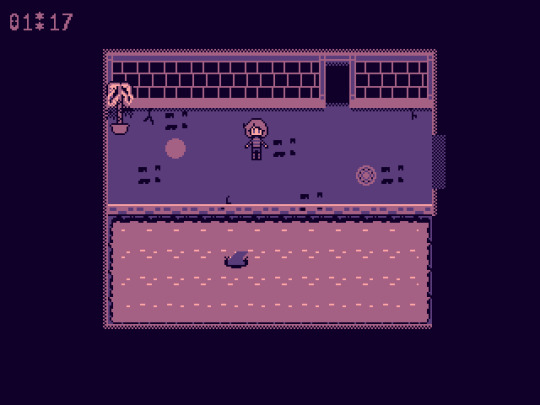
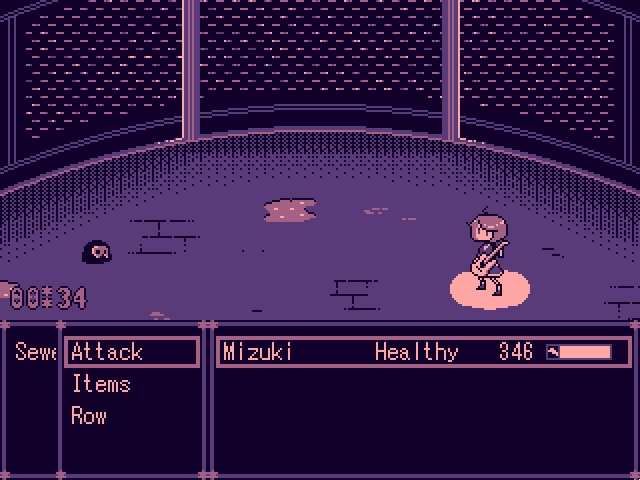
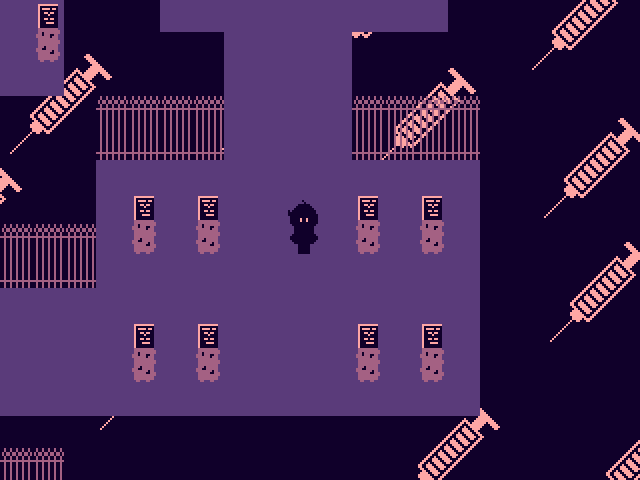
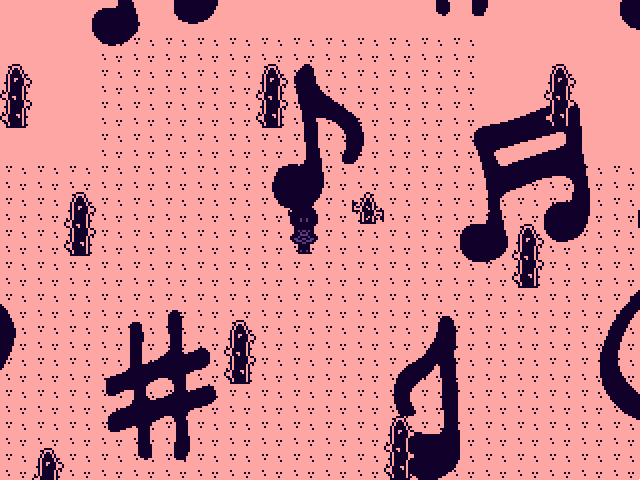
March’s Featured Game: acai cOrner
DEVELOPER(S): moca & Mitty
ENGINE: RPG Maker 2003
GENRE: RPG, Adventure, Surreal
SUMMARY: acai cOrner is about Mizuki, someone who has fallen into the sewers and who happens to find their favorite electric guitar! Upon obtaining the guitar, Mizuki turns into a magical girl who must defend herself against spooky sewer creatures using the guitar's magical powers.
Download the game here!
Our Interview With The Dev Team Below The Cut!
Introduce yourself!
*moca: Hi, I'm moca, a Starbucks barista aspiring to be a writer and game developer. I have been making RPG Maker games for about six years now, with my first two projects being a Pokémon fan-game and a Corpse Party fan-game. Those two happen to be my two favorite franchises as well! I have also created the RPG Maker game MOMOKA (IGMC 2018). I have founded a group called 'Team Shibu!' dedicated to making horror games! Our current project is a RPG Maker survival horror game named 'Katharsis'.
*Mitty: Hey there, I'm Mitty! I've been working with Moca on several games for a while now, helping with mostly graphics! Please support him, as he is very kind and hardworking!! I'm also the main developer of a game called "Marinette", so I hope you'll check that one out too, when the demo is released!
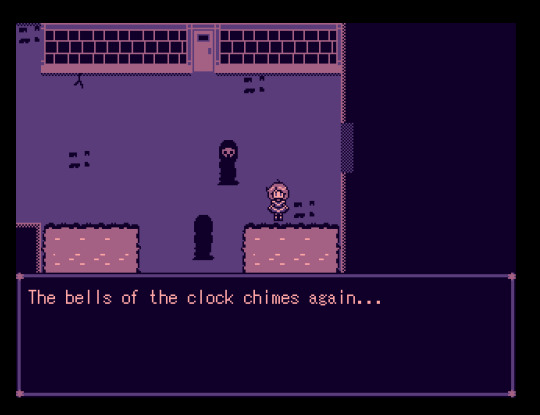
What is your project about? What inspired you to create this game initially?
*moca: acai cOrner is an experimental spooky RPG Maker game that only uses 4 colors! You are a magical girl with a just-as-magical electric guitar that you use to fend off spooky sewer slimes and other weird enemies you find in the surreal sewer system. It's half exploration and half RPG battles.
What inspired me to create acai cOrner initially was to actually get myself back into the groove of making games again. I had just recently came back from a hiatus and found myself having trouble getting back into the development of 'Katharsis'. That's when I decided to make a short, experimental game to get the juices flowing.
How long did you work on your project?
*moca: acai cOrner was finished in just about under a month!
Did any other games or media influence aspects of your project?
*moca: I had always wanted to make a Yume Nikki-like game and thought this was the perfect opportunity to try. So for the more surreal parts of acai cOrner, I took inspiration from Yume Nikki and a Homestuck random planet generator. Gameplay wise though, I took inspiration from a RPG Maker game called Ghost Suburb 0! I really loved how unique it was, especially with the timer and no dialogue aspect. I knew I wanted to do something with a timer, so I tried a rogue-like approach with the gameplay.
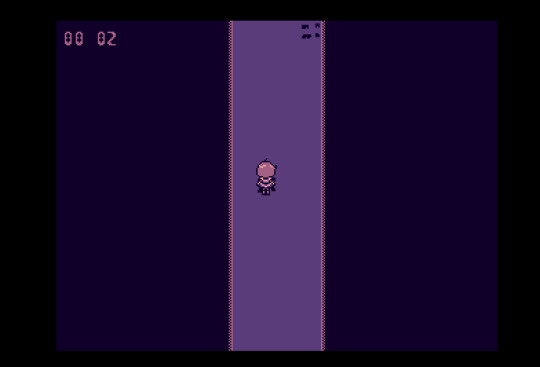
Have you come across any challenges during development? How have you overcome or worked around them?
*moca: If you played any of my previous projects, you know that acai cOrner is vastly different than anything that I have ever done. I'm so used to using words to describe the violence in my games, so when it came to making the story, I had a lot of trouble. It wasn't until I looked deeper into why people like these types of games that I had realized that people like to interpret the story on their own, guided by exploration, to enjoy these games. After that, I let loose a bit and made something more open-ended. Another challenge was the difficulty. I was the only one playtesting the game, and since I knew the game front and back, and had no trouble getting the ending. That's why when I sent out demos to friends, I was really discouraged to hear that the experience was mostly frustrating and rage quitting-inducing haha. I worked closely with their feedback and made changes accordingly to make the experience less frustrating but still difficult.
*Mitty: I think I was going through a weird artblock during the development of the game, so for some of the illustrations and backdrops for each area's fights, Moca sketched out the basic idea of what it could look like, and I just put my spin on it! It made the work much easier and faster!
Did any aspects of your project change over time? How does your current project differ from your initial concept?
*moca: Well, the game was meant to be short so there wasn't room for any big changes. Sure there are a couple gameplay changes and enemy tweaks, but not anything mindblowing. I added in the idea of making four surreal worlds kinda last minute, if that counts, haha.
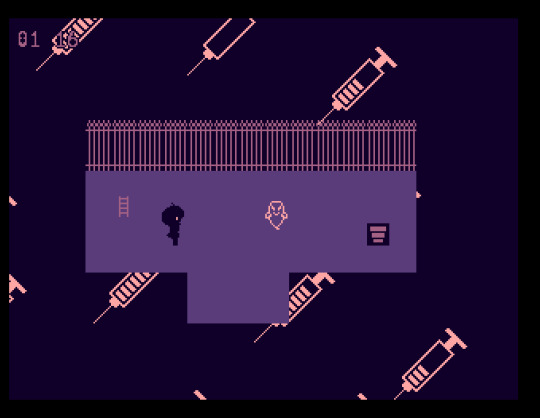
What was your team like at the beginning? How did people join the team? If you don’t have a team, do you wish you had one or do you prefer working alone?
*moca: In the beginning, it was just me! I didn't think I was gonna need any outside help since this was supposed to be a relatively easy project to release, but the further in development I got, the more I realized the game needed pizazz. The four color limitation wasn't enough for my lack of graphical talent. That's when I contacted Mitty about helping with the games battle backdrops and sprite animations! She is also a member of Team Shibu!, but we have collabed together even before that. Her art really made the project shine and I enjoy working with them on games!
*Mitty: Moca contacted me, and I wanted to help! We are working together on another game called Katharsis, so we are quite familiar with each other. I like working with other people, especially if I'm not in the lead, it releases a bit of the pressure I feel sometimes ahaha
What is the best part of developing a game?
*moca: To me, it's seeing everything come together and just... working exactly the way you envisioned it. As a game developer, you section the game off into parts to make development much more organized and faster but seeing it all come together in the end. Pure bliss *chefs kiss*.
*Mitty: I like a bit of everything, but currently I've been enjoying animating and spritework, as well as map assets' designs a little more than usual!
Do you find yourself playing other RPG Maker games to see what you can do with the engine, or do you prefer to do your own thing?
*moca: Mm... not really! I have an idea of what the engine can do, so when I do go out of my way to player other RPG Maker games, it's usually for writing inspiration rather than gameplay inspiration. Ghost Suburb 0 is something that I accidentally stumbled upon and immediately fell in love with it the minute I played it haha. (Fun fact: the developer of Ghost Suburb 0 is apart of Team Shibu! and is in charge of monster design!)
Which character in your game do you relate to the most and why? (Alternatively: Who is your favorite character and why?)
*moca: There is a rat in the game that is internally called 'Ratthew' who leads you into a funky room. I relate them the most.
*Mitty: I relate to the land sharks the most on a spiritual level. They are pretty much confused beans, and that's very relatable.
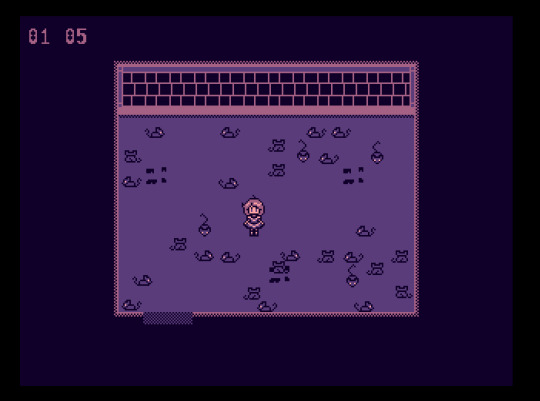
Looking back now, is there anything that regret/wish you had done differently?
*moca: I wish I added more random spooky events and trap rooms. But the game was also supposed to be short and I knew that if I kept adding more and more things, development was never gonna end haha.
Do you plan to explore the game’s universe and characters further in subsequent projects, or leave it as-is?
*moca: Well, by the time this interview comes out, there should be a new update for the game. The update should include 100% custom music by a talented composer, and a nerf in difficulty. As for sequels, who knows! The next time you see acai cOrner may be in 3D.
What do you most look forward to upon finishing the game?
*moca: Definitely the fan reaction! The satisfaction of seeing your work being noticed by people and actually enjoying makes me happy. It's also the relief of just... finishing something!
*Mitty: For this particular project I was obviously looking forward to seeing what people said about the little animations and such ahaha! I also was curious about the reaction to the timed difficulty mechanic, I had never seen anything like that before Moca presented it to me, so I had no idea on what people's feedback would be.
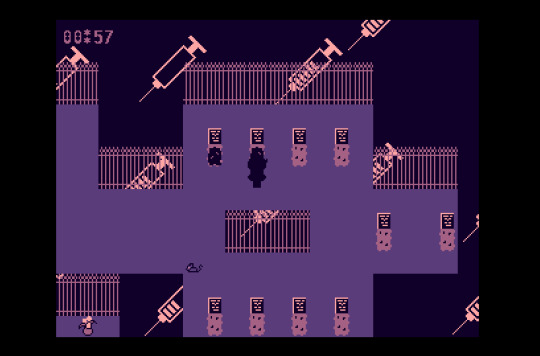
Is there something you’re afraid of concerning the development or the release of your game?
*moca: How people will handle the difficulty. The game isn't supposed to be completed on your first playthrough, but in 2-3 playthroughs. There are rooms and places that are meant to waste your time that you should ideally skip the more you play. By later playthroughs, you should be shaving time and be better. I understand that it's not handled as best I could, but I think the experience should still be challenging and hopefully fun!
*Mitty: I was a little conflicted on the timed mechanic, I loved it because it's pretty original and helps set an interesting athmosphere of worry and unease, and also seems to tell a bit of the vague story; and at the same time I don't like it much because I prefer more story-driven games and the vagueness mixed with the mechanic feels different from what I'm used to playing! I think it's more of a personal taste kind of thing, it was an experimental jam game, after all!
Do you have any advice for upcoming devs?
*moca: Take it easy! Take short breaks throughout development. And most importantly, have fun. If it's a hobby and it's making you overly stressed, just take a step back!
Question from last month's featured dev @ressurflection: What would you say is the weakest part of your game development?
*moca: Procrastination. I'm so bad at sticking to my own schedule, it's something that I try to keep in check when working with a team especially.
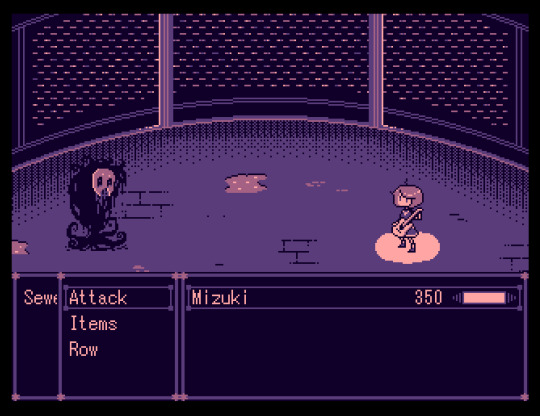
We mods would like to thank moca & Mitty for agreeing to our interview! We believe that featuring the developer and their creative process is just as important as featuring the final product. Hopefully this Q&A segment has been an entertaining and insightful experience for everyone involved!
Remember to check out acai cOrner if you haven’t already! See you next month!
- Mods Gold & Platinum
#rpg maker#acai corner#acai corner game#rpg maker games#pixel games#indie games#gotm#game of the month#march#march 2020#2020#moca#mitty#interview#needles
272 notes
·
View notes
Note
Hiya! I just saw your post about microaggressions in media, and I was wondering if you'd be willing to explain a little bit more about how Dragon Age negatively represented indigenous peoples; personally, I saw how the parallel was drawn, but I'd like to understand the difference between metaphor/symbolism and negative derivement. If you don't wanna, that's ok! Thank you for your time : )
Sorry if you wanted this to be replied to privately. I’ve gotten a few other questions about it so I just decided to do a masterpost.
I do feel obligated to mention that I have a Dragon Age tag and that I’ve gone into detail about the issues with the games here and here.
Now, with that being said. . . I’m going to put this under a cut because this is an important topic to me and I’ve never gone into as much detail as I should have. I’ll also give a basic but long rundown for people who haven’t played Dragon Age and aren’t aware of the context. I’ll try to make it obvious where that part ends for people who just want to skip right past it.
Disclaimer that I never really played Origins so this will only focus on DA 2 and Inquisition.
This is gonna be really fucking long and I apologize for that.
For anyone who isn’t familiar with the Dragon Age franchise, here’s some basic information relevant to this topic. There are four fantasy “races” in the game; the humans, the elves, the dwarves, and the qunari. For the purposes of this conversation, we will not go into the dwarves and the qunari.
Humans are the dominant race in the game, with control over every government in the continent that the franchise focuses on, Thedas. They follow a religion called Andrastianism, which is centered around the Maker (a vague and featureless single god who is almost always referred to as male) and Andraste, the Maker’s mortal wife and prophet who was executed and burned at the stake. In other words, it’s Fantasy Christianity™. The religion is separated into two branches, with one being led by men and only being common in one country in Thedas and the other being led by women and being common in the rest of Thedas. Just like Christianity, it is very heavily focused on converting people. As far as I’m aware, it is the state religion of every country featured in the franchise. For the purposes of this conversation, I will be referring to this religion as the Chantry, the in-game equivalent of the Church being used for Christianity.
Elves, on the other hand, are exactly what they sound like. They’re elves, but not traditional Tolkien elves. They have the same lifespan as humans and don’t seem to be particularly special. The important thing to note is that they are very much an oppressed group and most racism you encounter in the franchise is aimed at the. They were the original peoples of many parts of Thedas, indigenous to several parts of the continent before they were violently massacred in wars and outright genocide, all in the name of Andraste. Here’s some information about the main attacks on the elves, in the form of the second Exalted March, a form of religious crusade. Cultural sites, including burial grounds and religious temples, were pillaged and destroyed. Historical records were confiscated and edited, language and culture records purposely destroyed, and countless artifacts were stolen and sold to wealthy humans. This happened long before the events of the games, but are ongoing issues, which I’ll get into later.
Modern elves in the game are separated into two main groups: city elves and the Dalish.
City elves are elves who are disconnected from their cultures and live in human settlements, where they’re often forced to live in slums (called alienages), pushed into dangerous and poorly paid work, and face violent abuse and mistreatment from humans in the cities. City elves are usually Andrastian, just like disconnected Natives are often Christian, though they cannot hold positions in the Chantry.
The Dalish, on the other hand, are elves immersed in their cultures, living in nomadic clans led by their Keepers. The majority of Dalish elves follow the Evanuris, the Elven pantheon which is made up of nine deities that each represent different aspects of Elven life. According to Dalish lore, these deities are not active in the world anymore because they were tricked by the ninth deity, Fen’Harel, a trickster god who sealed away the rest of the gods from the world. When Dalish elves reach maturity, they undergo a ritual that involves receiving their vallaslin (blood writing), which are intricate facial tattoos that represent different deities in the pantheon and, supposedly, reflect that person’s role in their community. I suppose the Native equivalent is finding out what clan you’re in. Dalish communities are centered are around halla, a type of deer that the Dalish see as sacred and use as a form of travel (they pull aravels, a kind of wagon), food (milk and meat), clothing, companionship, and guidance. The parallels to bison should not be lost.
Elves are also frequently enslaved, particularly in Tevinter where slavery is still completely legal.
Now. Humans, elves, and qunari all have a connection to the Fade, the origin of all magic, spirits, and demons. That means that they all have the potential to have mages, people born with magic and a deeper connection to the Fade; they’re the DA equivalent of sorcerers in D&D for all you nerds out there. Across the board, mages are heavily oppressed (with the exception of mages in Tevinter).
Because they can be possessed by demons and potentially use blood magic, they’re seen as inherently dangerous and forced into Circles, isolated areas where they’re under constant surveillance as they learn to control their magic, and that surveillance is done by Templars, an order of warriors trained to be able to repress a person’s magic. Any mage that doesn’t have absolute control over their magic is made Tranquil, which cuts off their connection to the Fade and, along with removing their ability to use magic, also removes their ability to feel emotions, have desires, and experience dreams. It’s essentially a fantasy lobotomy. In some Circles, this is done on the whims of Templars to any mage that causes the slightest issue for them. Other forms of abuse are also incredibly common in Circles.
So! That’s the end of the context explanations! Let’s move onto the indigenous-coding in the game!
The coded group in question are the elves, particularly the Dalish. They’re also coded as Jewish and Romani, which makes the information that’s going to follow even worse. Despite popular belief, this coding is not actually up for debate and has been directly confirmed by David Gaider (scroll a bit, and be warned that he uses the g-slur). Since I’ve already explained what Dalish elves and city elves are, I doubt I have to get into how exactly they’re Native-coded and I don’t really feel like doing that anyway. So let’s just get right into the issues with this coding.
The first issue is the elves themselves. Elves are cool, I love elves. But it’s really fucking shitty to make the Christian-coded group human while the group coded as indigenous, Jewish, and Romani is inhuman. It’s a really common trope in fantasy and sci-fi and directly contributes to the dehumanization of our communities. It also gives fans the ability to brush off criticisms of their depictions because they’re “just elves”, something I see in the fandom a lot.
We also have to think of how elves in media are depicted in general. They’re usually magical beings with unnaturally close ties to nature, and as a Native person who has been asked if I can speak to eagles and if I live in a tipi in the woods, that is not a stereotype that needs to be further associated with indigenous groups.
Elves are degraded constantly by every character in the series, and the narrative depicts Dalish elves especially in a terrible light. There is only one companion in the entire series who actually genuinely cares about the Dalish, and that because Merrill is Dalish herself, having left her clan to live in the city; she’s also frequently mocked and depicted as naive and ignorant despite being a grown-ass woman and her rivalmance is dangerously unhealthy and toxic. In Dragon Age: Inquisition, you can have two elf companions, both of who explicitly hate the Dalish and disapprove of any pro-Dalish stances. One of those companions, Sera, also hates elves in general and frequently distances herself from them. Solas is a whole other can of worms.
If you play as a Dalish Inquisitor in DA:I, you are faced with constant mockery and scorn at every angle. Dorian, a Tevinter mage, explicitly tells you that slavery is better than being poor and that his family treats their slaves “very kindly”. You cannot call him out on this; he says his piece and then the conversation ends and can literally never be mentioned again, even if you romance him. Cassandra, who is very pro-Chantry, asks you why you can’t just “make room” for worshipping the Maker alongside the Elven deities. Any support of the Dalish earns you immediate disapproval from all of your companions. You cannot be openly Dalish without being directly punished by the game.
I mentioned earlier that Dalish elves and city elves both live in tightly-knit and isolated communities, Dalish elves in the form of nomadic clans and city elves in the form of alienages. There’s safety in numbers, but when you’re surrounded by enemies, that can also be incredibly dangerous. At multiple points in the series, entire alienages and clans are massacred. More often than not, this is completely unavoidable, and when it can be avoided, it’s extremely difficult to do so.
In Inquisition, if you play as a Dalish Inquisitor, you will start to receive war table quests regarding your clan. If you make even one wrong choice (and there are several choices you have to make, most of which are misleading), then your entire clan is massacred along with the elves in the city they’re settled by. The incident leading to their possible deaths is actually caused by a human noble poisoning other humans in the city and blaming the elves, since the alienage had a different water source and there was a clan settled near the city.
In Dragon Age 2, you can directly massacre Merrill’s entire clan. Even if you choose not to do so, the clan suffers heavily, losing their First (the future Keeper) to the city and then losing their Keeper to demons. They end up stranded in that area due to their halla dying, which means that their aravel couldn’t be pulled.
At another point in Inquisition, you encounter a clan that suffers heavily as well when a huge swath of them are massacred by Red Templars. You can do absolutely nothing to prevent this.
In the same area that the last clan I mentioned is found in, there are several quests regarding it, several of which stick out to me.
One requires you to literally desecrate a Dalish burial site to finish the quest (The Spoils of Desecration, it’s literally in the name).
Another quest gives you the task of finding a sacred golden halla, a legendary spiritual and religious figure to the Dalish, and guiding it to the unnamed Dalish clan. In this quest, you can also choose to just straight up kill it (The Golden Halla).
There’s a main storyline quest that involves going through a historical site to discover the truth about a massacre that had always been blamed solely on elves. At the end of the quest, you can choose to give these new records to either the clan I talked about or to the Chantry, who, if I remember correctly, modify the records to be about the Dalish becoming violent after one of their clan members converted to Andrastianism (The Knights’ Tomb). If you choose to give the records to the Dalish, a follow-up quest involves the clan asking for your help gifting a halla to the human village that was part of the incident, which you need to either trick or force the village into accepting (Bestow Mourning Halla).
Moving on. . .
In the quest Wicked Eyes and Wicked Hearts, you meet the human empress of Orlais, Celene, who you have to protect from assassins. You also meet her handmaid, spymaster, and former lover, an elf woman named Briala. And of course, Celene’s terrible cousin Gaspard, who is not really relevant for this discussion. Just know that he’s awful.
In this quest, you have to uncover information about these three people and use that information to manipulate the situation and get your desired ending. There are several possible endings you can choose, but we’re going to focus on one specific one for right now, namely the one where you can choose to help Celene and Briala reconcile and become lovers again, with Celene ruling Orlais and Briala being her partner and advisor. Sounds great, right? The lovely women get their happily ever after and everyone is happy.
Except that the game doesn’t give you the full story. Not in the slightest. Instead, it depends solely on you having read The Masked Empire, a book that is completely separate from the game and that many players don’t even know exist. It gives a very different context to this game, and especially to Celene and Briala’s relationship. I recommend reading this post from @dalishious because I cannot possibly explain the situation better than they have on their blog. If you’re into Dragon Age, I recommend giving them a follow in general because they offer some really great perspectives on DA as a Mi'kmaw person who knows a hell of a lot more about the franchise than I do.
(The quest also tries to convince you that Briala is on the same level as Celene and Gaspard. That is complete bullshit, as dalishious gets into here.)
So, to add to its very long list of crimes, Bioware purposely withholds information from the player in order to trick you into getting an elf back together with her violently racist and incredibly dangerous abuser.
And if I remember correctly, you can also discover a hidden room in Celene’s palace which is filled with broken Elven artifacts that Celene was experimenting with.
In Inquisition, you also encounter at least two Dalish elves who explicitly talk about being kicked out of their clans for being mages, left to make it on their own or die. Which is. . . absurd and doesn’t fit pre-existing lore at all, since clan Keepers and their apprentices are literally mages themselves AND it’s already been shown that if a clan cannot support or doesn’t need people with specific skills (not just mages but also crafters, traders, hunters, etc), then it will actually send those people to other clans to live with them. Merrill, the Dalish companion mentioned earlier, is one such case, with her original clan having an excess of mages and sending her to a different clan who needed a mage to train as a first. Changing that to say that clans now outright abandon mages, especially as children, was a ridiculous choice and makes me feel like it was done purely to show them as ~savage~.
(I personally headcanon that it was a lie spread purposely by clans to protect themselves, playing off of racist ideas of what they were like. No templar would go up against an entire clan just to drag two or three mages off to the Circle, but multiple mages? Five mages? A dozen? Now that would be worth the risk.)
And now it’s time to get into the worst part of the games, by far.
Trespasser.
In this DLC, you discover that one of your elf companions, Solas, is actually the god Fen’Harel, and that he’s essentially trying to destroy the entire world to “reset it”.
You also discover that your gods are false.
That’s right. Bioware based this community and culture off of Jewish, Romani, and Native peoples. And then made the gods fake. Explicitly told players that the Dalish are wrong about everything they’ve ever known, that their religion is all fake, and that it’s their own fault because they dared try to recreate their culture with the scraps they had left.
Oh, but it doesn’t end there, no. The gods aren’t just fake, they were actually slave owners! They were rulers of an ancient civilization and the vallaslin, those beautiful markings that represent a Dalish elf’s pride in their culture and their place in their community, are actually slave markings to show who your owner is!
I need you all to take a moment to process this. To think about the implications of basing a fictional culture off of oppressed communities in the real world, as a foil to the Fantasy Christianity™ that you as the player are constantly shoved towards, and then making that culture’s religion into something so terrible and warped.
Have you thought about it? Because I have. I’ve thought about it a lot.
So yeah. There’s my extremely long rant about indigenous coding in Dragon Age. I hope it helps the very few people who manage to get to the end without getting sick of it lmao
#dragon age#dalish#dalish elves#indigenous representation#indigenous coding#long post#i am so fucking sorry to everyone on mobile#jamesissosogay
412 notes
·
View notes
Text
A survey about surveys.
1 - What’s your favourite type of survey to take?
The kind with random and interesting questions. I like ones that allow me to elaborate, ramble, and vent opposed to just straight yes or no. And more than just the basic questions. Ones with categories or themes, like this one, are cool as well.
2 - What about your least favourite? Do you ever take these anyway if you can’t find anything else?
I don’t like bolding or shuffle surveys.
3 - Do you have a favourite survey maker? How long have you been following their blog for?
@ohsh1t2wksl8 , who I’ve been following that and her other blog for several months now and @lets-make-surveys, who made this survey, I followed just recently. I had another favorite that I followed for a long time, but they disappeared like year or two ago. :( I forget their name now. Ooh, and @tickle-my-pickle provided a ton of fun Christmas surveys, and they have a couple New Year’s ones now as well.
4 - Do you ever get surveys from somewhere that isn’t Tumblr? What other sites do you like to use for finding surveys?
When I can’t find any to do on here, which isn’t too common anymore, I go to LiveJournal.
5 - Do you like to take surveys at a particular time of day?
Yeah, they’re part of my nighttime routine.
6 - Do you have a favourite location to take surveys - eg. on your bed or in the living room?
I’m always in bed doing them.
7 - How often would you say you took surveys? Do you go through phases of taking loads and then stopping for a while?
Oh, I typically take several a day. I may skip a couple or days or so, but it’s pretty rare. I’d say I’m pretty consistent. Also, I’ve been taking surveys longggg before Tumblr.
8 - Do you like to watch TV or listen to music while you take surveys?
I listen to ASMR while taking them.
9 - Have you ever taken surveys with another person before?
Back in the Myspace days I sometimes did one with my cousin if he was over. But I like doing surveys by myself, they’re like my diary and time to vent and ramble and whatnot.
10 - Do people in real life know you take surveys? If not, would you be embarrassed if someone found out about your blog?
I’ve had friends and cousins who knew back in the day, but no one knows about this blog and I’d like to keep it that way.
11 - Do you often have something to eat and drink next to you while you take surveys?
I always have water bottles on my bedside table, but I often have a Starbucks Doubleshot energy drink as well when I take surveys. I’m a very routine person and if I have one of those it’s later after dinner and I take hours to finish them cause I’m a super slow eater and drinker, so I still have it to sip on when I’m doing my nighttime routine. I don’t eat anything while taking surveys.
12 - What kind of chair or surface do you find yourself sitting on the most when you take them?
I take them in bed.
13 - Have you ever taken surveys at work before?
Well, no. I’ve never had a job.
14 - Do you prefer doing surveys on a laptop, a phone or another device?
I only take them on my laptop.
15 - What kind of surveys would you like to see more of? What about less of?
More random and interesting ones. I’m glad I’m still able to find any to do since I’ve been doing them for so long, ha.
16 - Have you ever discovered new bands, TV shows or anything through reading other people’s surveys?
Yeah.
17 - Do you like to read other people’s answers? Are there some people whose blogs you always check?
Yes. There’s a few of you whose surveys I like to read. I feel like we’ve gotten to know each other a lot through our surveys even if we don’t necessarily talk. I’m still rooting for and supporting ya’ll. (: I’m here lurkin’ haha.
18 - Have you ever taken a survey while drunk or high?
Yes.
19 - Have you ever attempted the 5,000 question survey? Did you ever finish or did you find yourself getting bored part-way through?
Yes. It’s been several months since the last time I did any of it. It has taken me quite awhile to get through it. The questions just get overwhelming for me. They’re too much and sometimes require way more thinking and creativity than I can do haha. I’m actually almost done with it, though, so perhaps I’ll finally get through it eventually.
20 - What first got you into taking surveys?
I somehow came across someone doing them on Xanga, I think.
21 - How old were you (roughly) when you first started taking them?
I think I was 14.
22 - What’s the reason behind you taking surveys?
It started for entertainment purposes, something to do when I was bored and to pass time. Overtime I really go into them and it became more than that. I genuinely like taking them. They’re like diary entries for me. It prompts and gives me space to vent and ramble. I’m also able to go back and read them if I want. It makes me sad all the surveys from my Xanga an Myspace days are gone. It would have been quite interesting to go back and read those. They also get me thinking about things. It helps as a distraction. They’ve just become part of my routine and I look forward to doing them.
23 - What’s one thing that would put you off taking or finishing a survey?
If the questions were just too weird and annoying.
24 - In your opinion, what’s the ideal length for a survey? Would you not bother taking a survey if you thought it was too short or too long?
I like when they’re at least 30 questions. I enjoy longer ones as well. I don’t like when they’re less than 20.
25 - Do you answer questions using proper spelling and grammar?
Yes.
26 - Do you prefer questions that require long answers or are you happy to take yes/no surveys?
Like I said, I like when I can elaborate more and not just a straight yes or no. Those get boring.
27 - Is there a specific style of survey that you’ve never taken before?
Hm. I’m not sure. I feel like I’ve done them all.
28 - What kind of surveys would you like to see in the future? That could be in terms of style or category or anything, really?
Like I said, more random and interesting ones. Keep ‘em comin.
29 - Have you ever shared your surveys with friends and family on social media?
Back in the Myspace days I actually posted them as bulletins. I can’t believe that because they’re so personal to me now.
30 - Do you find that time goes by quickly or slowly when you take surveys?
It helps pass the time.
4 notes
·
View notes
Text
I’m Not Alone (Part Two)
Part One
Summary: Joan receives a text from Thomas asking them to come over.
Warnings: food, system switches, fear of abandonment (let me know if I missed any!)
Word Count: 1,697
A/N: I am,,, super aware how rushed this chapter seems. Apologies!! I just wanted to get it out before the New Year!!! Thank you all so, so much for reading part one and being so interested!!! It means a lot!!!
-----
New Message from: Tommy Salommy
-Joan?
Reply sent:
-sup
New Message from: Tommy Salommy
-I need to speak with you on a matter regarding my OSDD system. Would you like to meet up for lunch?
Reply sent:
-Yeah of course, is everything ok???
New Message from: Tommy Salommy
-Everything is fine. I just want to properly explain what we weren’t able to the other day, if you would be comfortable with that.
Reply sent:
-thats fine. ill be over in a few
New Message from: Tommy Salommy
-Excellent. Drive safe.
-----
The second Thomas opened the door, he held out his hand. “I believe it’s time we had a proper introduction. My name is Logan.”
Joan stumbled and blinked for a moment, but they did their best to recover quickly and shook his hand. “Uh, Joan. Nice to meet you,” they replied.
“Well, technically speaking, we’ve met several times before. However, I do appreciate the pleasantry.” Logan adjusted his glasses and lead them inside.
Wait.
“What’s with the glasses?”
Joan turned the corner in time to watch Logan pull the glasses off of his face and glance them over. “Well, plural dissociative disorders affect more than just… ‘the mind,’ so to speak. It also impacts certain physical aspects of the body,” he explained, “such as our vision. Patton and I, though we do not share the same prescription, share this pair of glasses.”
“Patton?” Joan asked.
“Our Memory Holder. He is also the one to most often take care of Virgil, whom you met the other day,” Logan continued. He put his glasses back on and gestured to the stove. “Would you like some Pesto Gnocchi? I admit that I am not the best cook, but I attempted as well as I could.”
They nodded and came forward, grabbing a plate out of the cabinet as they did. “Is this the Hello Fresh stuff from this week?”
“Indeed.”
The two got their food and moved to the table, and they ate in silence for a moment. Logan had been right about not being the best at cooking—the pasta was a little underdone, and the mushrooms definitely burnt –but at least it was edible. Joan wondered if the wrong prescription glasses had anything to do with it.
“So… What’s your role in the system, again?” they asked.
Logan set his fork down. “I take on the role of Gatekeeper, meaning that I am in control of who is fronting, or controlling the body, and who is allowed into certain areas inside our Inner World. Thomas and I had agreed that I was supposed to be the one to explain everything to you, as I have done the most research out of us all.”
“Oh,” they said, “So you’re the one who let Anxiety be in control the other day?”
His face turned a brilliant shade of red before he shot them a glare. “Well, I did leave someone else in control,” he snapped, “But it seemed he chose to ignore his orders and allow Virgil to be forced into the front. I can’t be there all the time when there are more issues to be addressed.”
Laughing, Joan held up their hands. “Alright, alright! An honest mistake, I get it!”
“It was. Alters are in no way perfect; we’re all just as prone to error as anyone else.” He stabbed a piece of pasta. “Also, it was not my mistake. It was our Protector’s.”
“Okay,” Joan giggled, “I understand.”
“Since we are on the topic, however, I suppose we should discuss what I invited you over for.”
“And that is?”
“Our OSDD.” Logan set his fork down again and adjusted his posture, folding his hands in front of him. “Joan, I—we—Thomas has Otherwise Specified Dissociative Disorder, Type 1b. There are multiple people living inside of our head. I understand this might come as a disturbance to you, but I can assure you that it is nothing like the movies and media you may have consumed about systems. There is nothing dangerous about us, nor hardly any other system that exists.”
“Media portrayals can be a real bitch,” Joan replied, leaning back in their seat.
Logan raised his eyebrows. “You certainly aren’t wrong about that. If you are… freaked out, so to speak, about this new information, it is… completely understandable, if you do not wish to remain friends.” His voice and shoulders lowered, and his eyes flicked away. “We will not hold it against you.”
That sent a wave of shock and sadness rippling through their stomach.
Joan furrowed their brow, frowning deeply as they looked Logan over. His lips were pressed tight together, and his head tilted down and away. All of his muscles were tensed as if waiting for the worst. Fingernails dug into his hands; breaths were short, yet calculatedly quiet.
It seemed to them that Logan was expecting rejection, but for the life of them, they couldn’t figure out why. They thought they’d always been supportive and clear that they were going to stick by his side no matter what; hell, especially the other day, they’d been extra careful to prove to Anxiety—Virgil? –that they weren’t going to be upset. Had they done something wrong?
Or… Or maybe Thomas had done this song and dance before, and whoever was in their current place had been less than kind. Maybe he’d just gone through some things that caused some trust issues, or—
Oh. Oh.
It was in that moment that they remembered what caused DID and OSDD in the first place.
Severe, persistent childhood trauma.
Trust issues suddenly didn’t seem too wild an idea anymore.
“Logan…”
Joan leaned forward and tilted their head to catch his eye; when he looked up, they reached out and put their hand on his.
“I am not going anywhere,” they firmly stated. “I said it the other day, and I’ll say it again: I’m always here for you. And I mean always. So what if there are more of you than I’d thought? That’s not going to change how much I love you. I’m happy that you trusted me with this information, but I never want you to feel like I’m going to leave any of you behind over this.”
Logan’s lip wobbled, and he quickly bit down on it. They rubbed a circle into his hand and offered a soft smile.
“I love you. All of you. Okay?” they said. “I’m not going anywhere.”
He nodded. “Okay,” he whispered. “Thank you.”
The two stared at each other for a moment, soft smiles lingering on each of their faces as they soaked in the moment.
And then, a huge grin nearly split Logan’s face in half.
He yanked his hands away and jumped to his feet, slamming his palms on the table. “Can I give you a hug?!”
Joan flinched a bit, but they recovered as quick as they could. “Uh… Sure?”
Letting out a squeal, he practically flew around the table before flinging his arms around their shoulders the second they stood up. They stumbled from the impact, but wrapped their arms around his waist anyway.
He hummed and buried his face in their shoulder, glasses nearly falling off his face. “We love you, too,” he muttered. “So, so, so much.”
“You’d better,” they teased.
He giggled, and then he sucked in a small gasp. “Oh, yeah! I’m Patton, by the way!”
Joan’s eyes flew wide open. “Oh! Uh… Nice to meet you.”
The two pulled apart, but Patton left his hands on their shoulders, beaming at them for a long moment. Joan couldn’t help but smile back.
Then, he winced and hissed, eyes squeezing shut. He lifted his glasses to pinch the bridge of his nose.
“Are you okay?” Joan asked.
He groaned and slowly nodded. “Ah… headache… Patton, how many times do I have to tell you not to do that…?”
They frowned. “What do you mean?”
“Patton has the atrocious habit of figuratively ripping control out of the hands of whomever is in the front when he feels any extreme emotions,” he explained. “It always leaves us with a terrible Switch Headache, and yet, he never learns.”
“Do you need Advil or something?” they asked, carefully putting a hand on his shoulder.
Shaking his head, he put his glasses back on, eyes remaining shut. “Pain relievers don’t affect these type of headaches, unfortunately. But I do appreciate the offer,” he replied. “Um… I believe I am still Logan, if there was any confusion.”
He took a slow, deep breath before carefully opening his eyes. Swallowing thickly, Logan glanced at the food and pressed his lips together.
“I suppose we need to finish eating,” he said.
The taste of burnt mushrooms hovered over Joan’s tongue. They shrugged. “I mean… if you’re not up for it, with that headache and all, we can always save it for later,” they suggested. “Wanna watch some Steven Universe?”
“Would you be alright with Jacques Cousteau, instead? I personally am not quite a fan of bright cartoons in general, and especially not when I have a headache.”
Joan nodded. “That makes sense. What’s Jacques Cousteau?”
Logan’s eyes lit up—they weren’t quite as bubbly as Patton’s, or as giddy as Thomas’s, but they sparkled in their own, unique manner. “Oh, it’s this wonderful documentary series from the 1970’s about marine biodiversity. Jacques Cousteau, the host, was a French film maker and marine explorer that had an extreme determination to teach…”
As Logan began to ramble on, he moved to lead them to the couch. Joan couldn’t help a fondness seep through their veins. He wasn’t Thomas. He wasn’t Patton. He wasn’t Virgil. He was his own person, one that Joan was going to get to know and learn about all over again.
Thomas and his system had to have gone through a lot to get to where they were now. Joan could only imagine what kind of pain, and shattering, and growth that he’d lived through. Their heart broke at the thought, but they couldn’t stop themselves from feeling proud of how far they’d come.
And they were going to be there for the rest of the journey.
143 notes
·
View notes